Will Americans Vote for a Man Who Is Now Widely Reported to Exude a Rancid Odor?
The one thing Donald Trump can’t bear people saying of him is something many near him confirm is true—he smells terrible. What will voters do with this intelligence? This report unpacks that question.
This content is free. To see 250+ more Proof reports across ten sections, and/or to comment on this report or past and future Proof reports, try Proof for free by clicking the red button below.
Introduction
The latest CNN primary poll in New Hampshire finds that “Donald Trump [is] at 40%, [compared] to Nikki Haley at 40%. In other words, the race is a tie by any definition.”
While the cable news outlet reports Trump is much better situated in Iowa, which is holding its GOP caucuses on January 15, caucuses are notoriously fickle. At any given caucus site, a candidate can go from significant support to none in just seconds—and that’s triply true if the weather (and thus the caucus turnout) is as bad in Iowa as many expect it will be. Moreover, the lead of 28 points Trump currently has on Haley in the nation’s first caucus is the smallest he’s had in any non-partisan poll since the summer of 2023 (with the exception of one other nearly identical poll from the same media outfits that put his current lead in Iowa at 28 points, NBC News and The Des Moines Register).
After Iowa and New Hampshire, Trump and Haley head to South Carolina, where the latter was a twice-elected governor.
All this may explain why Trump melodramatically threw one of his most well-known supporters under the bus just a matter of hours ago.
Simply put, ardent Trump booster Vivek Ramaswamy (R-OH) has an 8% vote share in Iowa and 6% vote share in New Hampshire that an apparently panicked Trump now feels he may need to win in those states. Trump’s anxiety was apparently sufficient for him to not merely urge Ramaswamy voters to caucus (Iowa) and vote (New Hampshire) for him but to torch his long-distance bromance with Ramaswamy, positioning the nonwhite Republican presidential candidate—in an echo of how Trump has spoken about nonwhite immigrants, Jews, and Black women—as a foreign interloper who is somehow “[in] disguise”, “very sly”, “deceitful”, “duping [the MAGA base]” (which is majority white) and “not [one of us].”
So why is it, then, that the thing Trump seems to have most feared from the last month is a threat he refuses to discuss at all—contrary to his decades-long modus operandi of punching back at even the smallest and most obscure slight? To put a finer point on it, why are so many in America now talking about how Donald Trump smells, and why is Trump acting like this superficially puerile question is somehow political Kryptonite?
The accusation that Donald Trump smells atrocious in person is so familiar to anyone who’s “extremely online” that you may well have already read the Know Your Meme page about it; or read some of the many, many major-media reports on the subject (see here, here, here, here, here, here, here, here, here, here, and here, for instance); or found yourself inundated, whether in the past few days or the past few years, with occasional appearances on social media platforms of hashtags like #TrumpStinks, #TrumpSmells, or #TrumpSmellsBad. Indeed, at one point in the final days of 2023, at least one of these three hashtags was trending on Twitter—arguably the most-used digital platform that’s still generally friendly to Trump—for several days straight.
A well-known former Republican congressman now reports that Trump smells like “armpits, ketchup, [and] a butt…all [put] in a blender.” Yahoo News has reported on widespread rumors in Washington and around the country to the effect that Trump “has a certain signature aroma that has rarely been described as being good.” Salon, in naming Trump one of the Republican Party’s “Biggest Losers of 2023”, described the ex-president—cheerily, if not wittily—as “Donald ‘Smells Like a Butt’ Trump.”
OK Magazine just regaled its readers with the tale of a viral video on TikTok—posted by a popular user on the video-driven, Gen Z-beloved platform—that relayed a strange narrative about Trump’s apparently infamous odor to American voters (a narrative that gained credence from the fact that it had previously been posted online by the TikToker in question long before hashtags about Trump’s smell were trending, and addresses a 1983 incident that predates Trump’s political career). As the user reported,
Years ago I posted [online] about Donald Trump being kicked out of Keens Steakhouse in Manhattan—where I was eating with my father in 1983—because his smell was so offensive.
The [smell] wasn’t an elderly thing; it was 1983. I wouldn’t make fun of Trump today, if it was an elderly thing. That’s not what we do on the left. It happens to elderly people. Trump wasn’t elderly [in 1983].
[My father and I] didn’t complain [about Trump’s smell]. The table next to him complained and the table behind him complained.
We smelled [him], but my father and I didn’t complain about it.
Trump was not elderly. [But] the smell was so f****** offensive that they finally had to ask him to leave [the restaurant]. And he did leave—quietly—and [his smell] wafted right by us.
Trump has been shitting all over himself for almost forty f****** years.
The above report led to an outpouring of testimonials about Trump’s smell on TikTok, which, while unverifiable, were remarkable in their consistency and their specificity.
One user wrote, “I did a project for Trump in 2017. 100% can confirm the stink. Also, he never paid our company [our] $350,000 invoice for products and services.”
Another wrote, “I heard this [about Trump’s odor] in the nineties from my neighbor who worked for [Trump].”
Yet another person wrote in to say, “That’s so true. I smelled [Trump] in the early nineties at an event afterparty. I really had the thought back then that he just saw himself [as being] so rich he didn’t give any…[thought to] his smell. I think he showers, but gas and not caring to wipe his bum was [the] issue. We saw him later in the evening surrounded by people; he was pulling girls into hugs and you could see they were pulling away, but he kept forcing them back. My friends and I left maybe two hours into the event.”
And the purported firsthand accounts just kept on rolling in. Others included these:
“I have a friend who went to military school with him, and he had an incontinence problem [then].”
“My dad has [been physically close to Trump] more than once. He also worked in Manhattan in the 1980s. Can confirm [Trump’s odor].”
There’s also a whole category of #TrumpStinks lore that comes from people who are famous but may or may not have been in Trump’s proximity. Seth Meyers famously said of Trump’s presumed rancid odor, “All Trump consumes are Big Macs and Diet Cokes. He probably has one bowel movement a week that looks like a scene from Jurassic Park.”
Digital entrepreneur Kate Dobson sells a Trump-scented, orange-coif-topped candle (pictured infra) that, as she explained to CBS News, smells like “a combination of steak and suntan lotion.” Dobson, for the record, doesn’t identify herself as either a fan or a critic of the former president.
Dobson’s ideation of Trump as smelling like meat became worthy of new attention when an old Trump foe—Hillary Clinton, who’s unquestionably been in proximity to Trump on both public occasions (such as presidential debates) and private ones (like his wedding to Melania Trump)—co-wrote a novel with Louise Penny in which a key character who is unambiguously meant to signify Trump, President Dunn, is said to “[smell] of meat.” This supposedly fictional representation of the then-president was so clearly intended as a real-life-inspired swipe that The Telegraph bluntly reported, in reviewing Clinton’s 2021 book, that “Trump smells ‘of meat’…[according to] Hillary Clinton’s revenge novel.”
Kim Jong Un, who certainly has been in close proximity to Trump—specifically, when they were side-by-side in the Korean Demilitarized Zone (and then several feet inside North Korean territory)—but who’s also not a very reliable source of information, once said of the then-president, “he cannot deodorize [the] nasty smell from his dirty body woven with frauds, sexual abuses and all [his] other crimes.” Trump’s response to the man he once bizarrely said he was “in love” with was shockingly muted.
And Michael Cohen, Trump’s longtime friend, fixer, attorney, and employee, has insisted, apparently seriously, that Trump has been using an oddly performative story about a trans weightlifter as cover for evacuating his bowels into an adult diaper during public rallies. While Cohen hasn’t always been the most reliable narrator when it comes to Trump foibles—though his record is far, far better than his detractors will admit—it’s true that many in media have wondered for months now why Trump keeps telling a creepy transphobic anecdote when his wife has repeatedly asked him to stop.
While all the individuals above were either posting publicly on general-use accounts on TikTok or speaking in and through other public fora, their narratives can only be given so much weight. But what if it turns out that these stories mirror what those who have been around Mr. Trump for years have insisted is true over and over again?
For instance, on December 16, 2023, one of the two Republican members of the House January 6 Committee, Adam Kinzinger, tweeted that he was “genuinely surprised how people close to Trump haven’t talked about [his] odor. It’s truly something to behold. Wear a mask if you can [when close to him].”
Trump’s former White House Director of Communications, Anthony Scaramucci, opined in 2020 that Trump “stinks”—though it wasn’t clear, in context, if the former top Trump official meant generally or specifically.
Defector reports—with an audio embed that is, candidly, quite compelling—that in the midst of one of the most infamous and melodramatically illegal phone calls of his presidency, his felonious early 2021 call attempting to get Georgia Secretary of State Brad Raffensperger to steal the 2020 presidential vote in Georgia for him, the angry then-president farted loudly on multiple occasions. As the digital media outlet wrote, memorably, of Trump’s loud pre-insurrection rip, “It sound[ed] like someone blowing into a French horn full of chowder.” (The incident was also reported out by a CBC program, which indicated that the sound in question, which Trump can immediately be heard apologizing for, is unquestionably a fart.)
We all fart, of course—but who does so in a conference call aimed at establishing a Seditious Conspiracy? It does seem to indicate a possible chronic flatulence issue.
Yet before we delve into substantially longer, more specific, and more disturbing first-hand accounts than any of those above—and they exist in spades—we must first ask a threshold question: is it okay to be reporting on any of this?
Can We Responsibly Talk About the Odor of Politicians?
I.
This is a difficult question, but we can at least find an appropriate starting point: the name of the person in D.C. who speaks most irresponsibly about how people smell.
That person would be Donald Trump.
As the New Yorker reports, Trump has long equated how someone smells with their value as a human being, telling a reporter in 2012 (the year reports indicate Trump decided to run for president in 2016) that “sometimes I smell things on people that… make [me] not like them.” A decade later—now well into his political career—Trump would be an old hand at equating smell and value, declaring of certain Californians, particularly the rich ones most likely to fund Democratic causes, “rich people from Beverly Hills generally speaking don’t smell so good. Their hygiene is not good. So when you meet somebody with a beautiful house in Beverly Hills, you know that person is sort of disgusting under there.” (ABC News has since debunked the bizarre conspiracy theory that seems to have prompted Trump to make this offensive remark.)
There’s even a book by a Pulitzer Prize-winning journalist often said to be friendly to (and with) Trump, Maggie Haberman, that recounts how Trump has long taken great pleasure in publicly embarrassing one his closest friends—Rudy Giuliani—for how he smells. As The Wrap summarizes,
According to Haberman’s book, while the twice-impeached former president was aboard one of his planes with Giuliani [in 2016], Trump made it a point to “loudly complain” about the smell after Giuliani had used one of the planes bathrooms, “so that other aides could hear.”
Per Haberman’s reporting, Trump yelled “Rudy! That [smell] is fucking disgusting!”
But Trump’s apparent hypocrisy over how others smell isn’t limited to abusing close confidants. In the clip below, we see him arrogantly, rudely, and quite uncomfortably attacking famed journalist Larry King on-air over his odor:
And of course Trump has made a great deal of money out of equating how someone smells with whether they deserve respect. He dropped a cologne called Success back in 2012, a scent Bloomberg noted cost $55 despite being one you could find for “$12 at the drug store”, adding that it was surely one of “the most arrogantly titled celebrity perfume[s] ever created.”
This was eight years after Trump released an arguably even more arrogantly branded product, a cologne simply called Donald Trump.
That one—Bloomberg reported—strangely had the same ingredients as “a salad.”
In a 2012 interview, Trump told GQ that before his thirties, he wore no cologne at all; that in his thirties he almost exclusively wore it “for formal events” (thus, relatively infrequently); but that sometime after this, for reasons he doesn’t say, he “changed” and “tend[ed] to use cologne more.” It is interesting, if perhaps coincidental, that this timeline tracks with revelations that Trump was thrown out of a steakhouse for his odor at 37, as Trump does imply to GQ that his shift to using colognes with strong smells (particularly “sweet” smells, he reveals) may have begun around the time he turned forty. Was the future president hoping to cloak an offensive native stench?
{Note: In my favorite literary work, Neal Stephenson’s New York Times-bestselling, 2,000-page The Baroque Cycle, a key villain in the narrative, the Duke d’Arcachon, has a perpetual rotten smell about him that he covers with a sweet-scented cologne. As Stephenson writes in one vital scene in the epic, “The Duke had put on cologne recently, something….with a lot of citrus. It did not quite mask another odor which put Eliza in mind of rotting flesh.” Stephenson is surely right to imply that those who have a putrid body odor sometimes try to mask it via sweetness.}
In any case, Trump is certainly willing to exact vengeance on those who fail to mask native scents that offend him. As he told GQ in 2012, “I have fired people that, and maybe it wasn’t the main reason, didn’t exactly smell good. Maybe that was an early indicator [of their inadequacies].” Is it presuming too much, then, to suppose Trump might fear voters spurning him for the same reason that he’s at times spurned others?
In fact, Donald Trump is infamous for mistreating those who disgust him—he simply uses the rhetorical veneer of being a germaphobe to do so. While it’s almost certainly true that Trump is authentically “the most germ-conscious man to ever lead the free world”, this doesn’t excuse or explain how he treats those who dare enter his presence and cough or sneeze even once. As Politico reports, quoting a former Trump campaign official, “If you’re the perpetrator of a cough or of a sneeze or any kind of thing that makes you look sick, you get that look [from him]. You get the scowl. He’ll put a hand up in a gesture of, ‘you should be backing away from [me], you should be more considerate and you should extricate yourself from [my presence].’” It is remarkable that a man said to regularly vacate himself into adult undergarments—see below—also has, as Politico details, a “hatred of involuntary bacterial emissions.” It’s a sort of “two-sizes-fits-all” narcissism, with one rule for the narcissist and another for the rest of the world. Historically, this sort of hypocrisy puts one in line for significant public ridicule and even calumny, but apparently Trump is able to maintain it without any consequences so long as he maintains at least some cultural influence. This state of affairs even more forcefully connects revealing Trump’s hygiene problems to the larger debate over how celebrities and other public figures treat those around them.
Consider, for instance, the story relayed by Politico about an ABC News interview the former president gave, during which—across the room, while cameras weren’t even rolling—White House Chief of Staff Mick Mulvaney began coughing. Trump’s instant reply was to angrily admonish Mulvaney, saying, “I don’t like that, you know. I don’t like that. If you’re going to cough, please, leave the room.” Per Politico, even staffers—of any level—who transiently “sound[ ] hoarse” have to steer clear of Trump until their voices return to normal (or at least to what Trump has become accustomed to hearing from them). Trump also “hates shaking hands”, even with those he does business with; and as for fans, he “hate[s]” when they “touch[ ] him”, according to Politico.
Does this affect whether these fans have a right to judge Trump for his own hygiene?
Certainly, even his own employees have made such judgments. As the aforementioned Anthony Scaramucci has said, clearly disapprovingly, of Trump and the question of personal hygiene, “He’s a ballbuster. If you’re standing by him, and you’re going to look at something on his desk, and you lick your index finger to open the thing to try to catch an edge on the paper, he’ll smack your hand and be like ‘What are you, disgusting?’” An unnamed former Trump campaign official was clearly haunted by a 2016 incident in which, as they told Politico, Trump was in the midst of an extremely serious conversation with Digital Media Director Brad Parscale, Deputy Campaign Manager David Bossie, and Campaign Manager Kellyanne Conway when the last of these had the temerity to cough—once.
Trump went “nuts” and stormed off, according to the official.
II.
A second subtopic we could turn to, in answering the question of whether it’s gauche to comment on a politician’s smell, is this one: does smell matter to voters as a matter of political science?
And the answer, it turns out, is a qualified yes.
The “yes” here is a “qualified” one because it turns out that one political demographic in particular is likely to refuse to vote for any politician who smells bad.
That demographic is Donald Trump supporters.
As The New Scientist reported in 2018, data research reveals that “the more easily disgusted a person is, the more they are likely to support Donald Trump.” Not only do “people who are socially conservative seem to feel disgust more strongly” and “people who score[ ] higher for disgust [on digitally delivered tests] also tend[ ] to score more highly for right wing authoritarianism”, but Swedish researcher Jonas Olofsson found specifically that “Those that are most supportive of Donald Trump have the highest body odor disgust sensitivity.”
And Olofsson isn’t even the first researcher to make this discovery.
University of Toronto researcher Yoel Inbar has compiled data that confirms that “People who are more disgust sensitive are more socially right wing….[disgust sensitivity] tells us…about social traditionalism, or whether someone voted Republican or Democrat.”
This may be one of two reasons—the other being that Trump generally smells bad—that Trump does something astonishing for him when his scent is raised in public: refuses to engage at all. If Olofsson’s research holds, there’s a great deal at stake for Trump in having his fans believe he smells good; in fact, given accounts of Trump smelling putrid dating back to the 1980s and 1990s, one wonders if Trump’s cologne releases in the 2000s and 2010s were in part intended to create a sense about him that he must, personally, smell nice—as what sort of person would peddle colognes when they themselves smell like (as so many are saying Donald Trump does) a dirty privy?
{Note: As a Trump biographer, I know that Trump first began speaking publicly of his desire to become President of the United States in the 1980s, so his exploits in the cologne sphere in the 2000s and 2010s came well into his decades-long scheme to gain the White House.}
When retired congressman Adam Kinzinger claimed firsthand knowledge of Trump’s scent, Trump and his spokespeople refused to engage with Kinzinger’s comments at all except to state (bizarrely) that they had knowledge of Mr. Kinzinger once farting in public—a nod, perhaps, to the fact that Trumpists are, the research shows, much more likely to dismiss anything said by someone who’s passed gas in public… as Trump has.
And yet, if Trump and his team are generally aware of this sensitivity among his fans, why not refute Kinzinger’s claims directly—as Trump habitually does claims he finds potentially damaging? Yet he has thus far remained silent on the matter of his odor.
III.
We come, now, to an overarching question: is the allegation that Trump has a putrid odor an appropriate topic for journalism? And does the answer to this question change if it turns out—as certainly seems to be the case—that accusations that Trump has some sort of inescapable personal hygiene issue appear to be the thing that scares him more than anything else his opponents in the political arena have ever thrown at him?
These questions must stand apart, of course, from the relevant political one: can the former president’s political opponents assail him for his scent? The answer to that question seems obvious: given that, in addition to having attacked non-public figures for their smell in the past, Trump regularly calls for the death of his political opponents, deliberately creates security risks for their spouses and children, and gets personal to a degree we’ve never seen before in U.S. politics—attacking not just his opponents’ appearance (for instance, calling his longtime friend Chris Christie a “fat pig” at a televised campaign rally) but their intelligence, mental health, loyalty to America, and personal hygiene—it’s of course within bounds for political opponents to return the favor. Indeed, even those who’ve never been in proximity to Trump might be inclined to note that in the largest-ever archive of Trump’s Twitter insults, compiled by the New York Times, there appears to be a suspicious absence of Trump attacking people who might be likely to attack him back for how they smell. As already noted, the absence of a Trump reply can sometimes be as telling to observers as the presence of one.
But the grounds for using Trump’s odor as a political weapon are even more specific than this. During the 2024 presidential campaign, Trump has already done all of the following:
Made his opponent’s age a key campaign issue, despite his opponent being only three and a half years older than him and both men being in their fourth quarter-century of life;
made his opponent’s physical condition a key campaign issue, despite it being more or less uncontested in major media or mainstream discourse that President Joe Biden is in markedly better physical health than his likely 2024 Republican opponent;
made his opponent’s medical history an issue, under circumstances in which Trump has been found—both before his time in office and after—to have hidden and falsified his medical records on repeated occasions (including using falsified medical records to dodge the Vietnam War draft);
formed both implicit and explicit political alliances with far-right demagogues like Alex Jones who are infamous for weaponizing grotesquely false and absurd allegations, immediately before the 2016 presidential election, that Democratic presidential candidates who Trump built his entire political career on attacking—Barack Obama and Hillary Clinton—“both smell like sulfur” (see video below);
made his supposedly superior genetics a political issue, a dubious, unseemly, and even eugenics-adjacent campaign boast that could not be sustained if he had one or multiple persistent medical conditions that since the 1980s have caused him to emit a foul odor over which he has minimal or variable control; and
made his supposedly uncontested “alpha male” status the implicit centerpiece of his political persona, such that his political standing—particularly among those members of his base who report to pollsters that they see him as a “strong leader”—could be grievously wounded by the revelation that he is physically repulsive to all those around him.
ABOVE: Trump friend and ally Alex Jones, an infamous insurrectionist demagogue, rants uncontrollably about Trump’s political opponents being not just “demons” but smelling of Hell.
All of the foregoing components of the 2024 Donald Trump presidential campaign—and indeed his political persona and rhetorical tactics going back to his origins as a politician in 2015 and 2016—would militate for journalists accepting that Trump has opened the door to questions about (a) his physical fitness to serve as President of the United States, (b) his past misstatements about his health status (including whether these statements were intended to obscure personal habits or embarrassing chronic ailments voters would naturally expect to learn about pre-election), and (c) whether the mystique Trump has attempted to weave about himself in preparation for becoming America’s first tyrant (which ersatz mystique is concocted from tales of popularity with women, unrivaled genes, and an age-defying physique) is in actual fact bollocks.
In short, if Donald Trump consistently smells of his own uncontrollably evacuated bowels, it’s likely not a new development—thus, not one linked to his age—and could indicate not just personal habits and/or medical conditions he has hidden from voters but a course of deceit upon which his entire political persona has long depended.
Alternately, if, contra the eyewitness reports we presently have—see both above and below—Trump’s odor is a much more recent development, it nevertheless touches on a premise Trump has made key to his re-election campaign: that Joe Biden is actually much, much older and much more infirm than him, when in fact Biden is three and a half years older and, unlike Trump, has released medical records that the public has no reason to mistrust.
Finally—and this is discussed much more in the “meme” section of this report, below—Trump and his digital media advisers have made daily use of memes in the 2024 presidential election in a way America has never seen before, and it’ll likely surprise no one that most of these memes traffic in disinformation about President Joe Biden.
This means that even if none of the accounts of Trump’s putrid odor have any truth to them at all, the fact that left-leaning voters, activists, and meme-makers are making and sharing and celebrating a new wave of “dank memes” related to Donald Trump’s purported smell marks a shift in the rhetorical resistance to what thus far has been MAGA’s near total dominance of the “meme warfare” landscape. Indeed, MAGA has crafted a lore for itself and U.S. politics that positions Carl von Clausewitz’s maxim as literal: “War is the continuation of policy with other means.” It’s for this reason that far-right, high-traffic social media accounts now speak in acid tones of so-called Democratic “lawfare” (thereby insisting that any legal process that may ensnare their leader is always-already tainted by the most poisonous sort of partisanship), even as MAGA forces dive deep into exponentially murkier and more toxic memetic waters.
Were American journalists to—apparently wrongly, given the facts available—take all accounts of Trump’s offensive scent as left-wing “edgelording”, these accounts would still represent a notable shift in liberal, progressive, and moderate-Democrat attempts to get those few voters still on the fence in 2024 to see the former president the same way most of the world does. There is a stunning gulf between how Trump’s fans think of him and how fashion experts see him, how scales see him, how psychologists and psychiatrists see him, how his family (from Melania Trump to Mary Trump) see him, how presidential historians see him, and how serious policymakers and diplomats and U.S. military leaders see him. Case-in-point: despite being a notorious draft-dodger who has often expressed contempt for U.S. soldiers in private and as the president allowed them to be literally shelled—most notoriously by his friend, Turkish President Recep Erdogan, in fighting in Syria, but also by Iranian proxies in Iraq after Trump lied to voters about his basis for assassinating a popular Iranian public figure in early 2020—Donald Trump isn’t widely seen as the man who repeatedly threatened to invade Venezuela and taunted another sociopath with his finger on a nuclear button (Kim Jong Un) on Twitter, nor as a man who implicitly argues that the United States should still be fighting in Afghanistan or the man whose coddling of Vladimir Putin emboldened him to re-invade Ukraine in 2022, but as a man of peace whose Abraham Accords (which deliberately, by all accounts, screwed over the very Palestinians now waging a war against Israel) definitely didn’t cause the current bloody war in the Gaza Strip and would, as he has claims he easily could, bring peace to Earth in a matter of hours of becoming president again.
The point is that helping Americans and the world see Donald Trump for what he is, not what his fans wishcast him into being, is the prime directive of all journalists who cover the man and his self-admitted dictatorial ambitions inside the United States. If Trump smells horrific, that’s not only an indication of why he’s hidden so much of his medical record from American voters but could also reveal personal habits that would impact his ability to serve as president. Indeed, they could even explain some of his most destructive conduct during his time in office. That it might also do damage to his reputation as a self-conceived “alpha male” is less of a concern for journalists, of course, but even that potential outcome to reporting on Trump’s odor would at least strike a blow for those in the journalistic establishment who—on matters of war and peace and even matters of personal conduct (like the fact that a federal court has held Trump to be a “rapist”)—have thus far had no luck getting news readers to simply see Trump for who and what he actually is.
But the issue goes much deeper than this.
One of the Biggest Lingering Mysteries of the Trump Presidency May Be Linked to Trump’s Odor Problem
Just as 2019 New York Times bestseller Proof of Conspiracy (link) extensively reported on and sourced underreported incidents like Trump permitting American soldiers to be shelled by a NATO ally in Syria, 2020 bestseller Proof of Corruption (link) called into question a surprise trip then-President Trump made to Walter Reed Military Medical Center in November 2019, a trip shrouded in so many obvious—and confirmed—lies about its true purpose that it led to a raft of conspiracy theories of varying credibility.
One of the more interesting such notions—given the very well-sourced confirmation discussed in Proof of Corruption that Trump didn’t first learn of a highly contagious virus emanating from China in January 2020, but rather in November 2019—is that the former president, who was said by staffers to be exhibiting signs of a cold when he went to Walter Reed that month, didn’t necessarily contract COVID-19 at the time but may have (as an infamous germaphobe and hypochondriac) believed he had. Such a sequence of events would explain why Trump’s bizarre, unscheduled trip to Walter Reed was treated as a national security emergency rather than a routine doctor’s visit.
But in her post-White House memoir I’ll Take Your Questions Now: What I Saw at the Trump White House (Harper, 2021), former White House Press Secretary Stephanie Grisham reveals that Trump’s trip to Walter Reed was for a colonoscopy—a procedure ordinarily conducted with a degree of sedation or anesthesia applied, and one that would’ve forced Trump to transfer presidential powers to Vice President Mike Pence.
As we would learn just a little over a year after Trump’s visit to Walter Reed, Trump appears to never have fully trusted Pence—so perhaps it’s no surprise that he allegedly opted to get his colonoscopy without any sedation or anesthesia so he could remain President of the United States throughout the procedure.
Well, so far so good: this is all weird, but loosely understandable. Men over 45 are now advised to get regular colonoscopy screenings, and Trump would turn 80 less than 18 months into his hypothetical second term. (In a never-explained revelation, Trump’s longtime personal physician Harold Bornstein implied to the New York Times that the New York City businessman began getting regular colonoscopies from him at age 34.)
The problem is that every piece of evidence compiled about Trump’s trip to Walter Reed confirms that it was an emergency visit. From the secrecy and lies surrounding it to eyewitnesses confirming that Trump was hurriedly stuffed in a U.S. Secret Service vehicle looking harried and disheveled, from the fact that no effort had been made to clear the route from the White House to the military hospital (which is not where the then-president had been receiving his routine checkups) to the fact that Trump already had a regularly scheduled doctor’s visit set up for just a few weeks later, all indications are that Trump had to have his colon checked not as a routine matter but an emergency one—and that this medical emergency could’ve affected Trump’s ability to physically perform the duties of the presidency. To this day we have no idea if there was a period of time in November 2019, as a novel coronavirus was ravaging China, when the United States didn’t have a compos mentis president at all.
This report puts aside the fact that Trump’s odor issue appears to have begun in his thirties and that colon cancer is now being found in younger and younger Americans. There are no present indications that Trump has colon cancer, so even though in its advanced stages such a malady can cause significant bowel problems that answer to some of the descriptions we’ve had over the years of Trump’s, the fact that Trump’s issues go back decades—at a minimum, according to the most reliable accounts, to the 2000s—diminishes the likelihood that he suddenly had an acute colon-related issue in his seventies. But a chronic issue? That is certainly a possibility. For instance, benign colon polyps can develop at a younger age and cause incontinence; because such polyps can become cancerous, a person suffering from very serious incontinence known to have colon polyps might have those polyps looked at on an expedited basis.
But Proof isn’t a medical journal, so our interest here is less in the medical issues or personal habits (such as unprescribed Adderall use) that can cause incontinence—or, apropos of the fallout from Adderall abuse, other otherwise unexplained conditions we see in Trump, like the “sense of grandiosity” Adderall misuse can cause—but simply whether there are explanations for well-known Trump habits like sleeping only 4.5 hours a night or, as this report details, having such terrible incontinence he must wear adult undergarments and (when they’re unable to control his bowel movements at work) spends much of the day emitting a putrid scent that makes the normal conduct of his business far more difficult. That business, of course, back when Trump was President of the United States, was the people’s business. We were paying for it.
So it’s worth noting that the latest brouhaha over Trump’s scent came from a GOP politician who at various points worked with Trump in D.C. on the people’s business.
And just as tellingly, one of the most acute attacks ever made on Trump by a foreign leader came from Kim Jong Un and had to do with Trump’s smell on an official visit.
Neither of these facts can be ignored.
Grisham’s book also informs Americans that the lies Trump and his team told U.S. voters in November 2019 weren’t just prompted by a President of the United States—startlingly—either having little faith in his vice president or little willingness to give up the powers of the presidency when duty required it (a form of malfeasance we all saw on January 6), but also by Trump’s fear of there being any televised content on… well, any of the various goings-on in his butt.
As Grisham recounts, pun perhaps intended, Trump “did not want to be the butt of a joke” because of his unscheduled colonoscopy, and was particularly attuned to the possibility there would be discussion of his nether regions on “late-night television.”
This is an interesting fear for a president to have. Note that Grisham doesn’t indicate that Trump feared political reporters finding out he had a serious medical condition, but that he feared the entertainment industry would make hay out of a non-emergency situation involving his rear end. And he was afraid enough of this latter scenario that he was willing to lie to the nation about his physical condition in some spectacular ways—a development consistent with the idea that Trump has a non-emergency bowel issue that he’s more embarrassed about than perhaps anything else in his public life.
And there’s apparently good reason for him to fear such embarrassment, particularly with respect to people in the entertainment industry.
The Griffin and Casler Accounts of Trump’s Smell
People who’ve spent considerable time around Donald Trump confirm that he smells awful—and have said as much on the record—though the cause of the stench is only sometimes stated with clarity.
The best example of a revelation that does offer such clarity comes from Noel Casler, a longtime staffer on Trump’s NBC reality show Celebrity Apprentice (2008-2015) who also worked alongside the reality-TV star on a number of beauty pageants during that same period.
It’s worth keeping in mind—as you listen to and watch Casler’s stunning account of Trump’s problems with incontinence and odor below—that Casler worked with Mr. Trump during the eight-year span immediately preceding his presidential term. In other words, this isn’t a narrative from a Manhattan steakhouse in 1983. Casler first went public with his allegations in a 2018 interview with People magazine, at a time when Trump was already president and the 2020 presidential campaign wasn’t underway; the timing of this interview certainly should cool concerns that Casler calibrated his revelation to maximize its political consequences. As for why it took Casler so long to disclose all this, he explains that he was under (like almost everyone who has ever worked with Trump) a severe Non-Disclosure Agreement Trump insisted upon that has since been found to be illegal as applied to many of the situations in which Trump used it. This is one of many methods Trump has used throughout his business career to keep business peers silent about him; others include threats of financial or other retribution, manipulation of future media stories about either himself or his enemy, or even more malign means of intimidation (perhaps, though we cannot know, even to the point of what one of his closest friends and advisers, Roger Stone, was just caught on video discussing). The aforementioned Michael Cohen testified under oath before Congress that in his ten years working for Trump the businessman had directed him to threaten people in some fashion or another “probably 500 times.”
As International Business Times reports, Casler says in no uncertain terms that Trump’s addiction to fast food and Adderall has caused him to become chronically incontinent, and that he’s had this problem since at least the 1990s—a duration that may explain why the late Dr. Bornstein (notably, a gastroenterologist) implied to the New York Times that Trump had been getting regular colonoscopies since the 1980s.
Per Casler, the result is not just that Trump must wear adult undergarments, but that on regular occasion during lengthy public events he soils himself in a way that those around him cannot possibly miss. Here’s what Casler—a musician, writer, comedian, and actor who is now a podcaster and political commentator—says (video thereafter):
[My allegation regarding Trump wearing diapers] is not a joke. It’s Depends [brand adult undergarments].
[I know] “Diaper Don” is trending, but it’s based in reality.
He would often soil himself on the Apprentice set. He’s incontinent from all the speed—all the Adderall he does, the cocaine he’s done for decades. All that staff has a laxative; it has an effect on your bowels. And his are uncontrollable.
He’s worn diapers since probably the nineties, but I saw it firsthand in the 2000s, on Celebrity Apprentice—in the late 2000s. We’d have to stop the show and change hi[s] [diapers].
That was [former Trump bodyguard] Keith Schiller’s job. He would take him off-set [and] he would wipe him down. Our nickname for Keith was “Wet Wipes.” [This] is not a joke; it’s happened several times.
You’ve [also] seen it happen while he’s in office. You’ve seen when he was in the Oval Office with [Turkish President Recep] Erdogan and you could clearly hear him evacuating himself.
He did it in front of [the late] Senator Dianne Feinstein [D-CA] at a press conference.
So he does it and he almost sits there [with his eyes wide] and unaware of it. One time I saw Ivanka have to go kind of whisper in his ear and then Keith came and took him off-stage.
He’ll also do it in a rage. And this is where it gets really drug-related. He’ll start to freak out. One time there was the word “arbitrage” on a cue card, and he started screaming that the script department was setting him up—“You’re setting me up!”—and he just freaked out and then very loudly evacuated his bowels. You could smell it. And the guy who was holding the boom mike was tearing up.
So that’s where the nickname—“Shitshow”—came from; that was the crew nickname for Celebrity Apprentice. So when you hear [people online say] “Diaper Don,” it’s not a joke.
He tries to hide it, [but] I’ll give you one more fact: if you look up the video of him when he was doing the WWF [Wrestlemania] thing, he tackles a guy [his friend Vince McMahon] on the ground outside of the [wrestling] ring and you can clearly see the outline of the Depends in his pants.
And here’s an image from the 2007 wrestling event Noel Casler references in his video interview:
Casler has, on several occasions, provided even more specific intelligence on logistical issues Trump faces because of his incontinence, revelations that could help to explain Trump’s highly unusual stance—which countless online memes (and even one media report) compare to the front half of a centaur. Such a stance, like Trump’s odd use of “toe pads” while standing at public events (which disclosure caused a “social media firestorm” when it was recently revealed) could be explained by Trump wearing the “hard plastic girdle” Casler describes below, an echo of the “body-shaping girdles” worn by 2008 Republican vice presidential nominee Sarah Palin, albeit for different reasons.
{Note: There may be more to the “toe pad” report—and accompanying photographic proof— than many suspect. As The Independent notes, Trump has long had an observable “forward lean” to his stance that the toe pads appear intended to correct. This is yet another indication that looking at Trump’s personal hygiene is important, as it could both rule in and rule out various maladies significant to voters’ voting decisions. For instance, many observers online, as noted by The Independent, opine that a notable forward lean is one of many indicators of Frontotemporal Dementia, a slow-progressing ailment that can also lead to “poor judgment”, “socially inappropriate behavior”, “loss of empathy”, “problems with balance”, and “a decline in personal hygiene”—all of which are relevant to Trump’s ability to capably serve as POTUS.}
Noel Casler isn’t the only longtime friend and co-worker of Donald Trump who has gone public about Trump’s chronic incontinence and the stench that results from it.
Kathy Griffin, another actor and comedian who worked alongside Trump on Celebrity Apprentice—and another person who formerly had a warm relationship with the ex-president, but has now become a critic—supported Casler as soon as he violated his NDA to reveal the truth as he saw and understood it regarding Trump’s private habits.
Griffin subsequently offered up the following in May 2023 regarding Trump’s smell:
I was never a contestant [on Celebrity Apprentice]. However, I did participate in two challenges [on the show]. One I did because of my dear departed, beloved Joan Rivers. The other one I did because Trump paid me a bunch of money to spend the day with Liza Minnelli and host a challenge. Liza and I tried to ignore him, but he does smell really bad.
She more recently repeated her accusation in a podcast interview with Trump’s niece, Mary Trump, during which conversation she elaborated on her understanding of why Trump smells. As Newsweek reports, writing on Griffin’s claims,
“Donald has a distinct smell that doesn’t really get enough press. It’s like body odor with kind of like a scented, makeup product. You can smell the hair products even outdoors”, Griffin said, which caused Mary Trump to cringe.
Griffin then reposted a video of her saying these comments to X, formerly Twitter, and added, “I went easy on him” alongside a vomit emoji.
Certainly we know, from Trump himself, that he uses a significant amount of haircare product to keep his hair installation in place; and we know Trump also wears a heavy Swiss bronzer intended to given him a hue somewhere between tan and orange; but Griffin’s reference to a “distinct….body odor” is interesting because of her confession that even calling it a “distinct body odor” is “[going] easy” on Trump—suggesting that she could have said more about the source of the odor emanating from Trump’s body.
{Note: Proof urges people to remember here that, as MSNBC and other major-media outlets have reported, many Trump critics are afraid to publicly challenge him in any way for fear of “violence” and the “personal safety” of themselves and their “children.” We should therefore not be surprised when even Trump’s most avid critics speak rather euphemistically about him.}
In late December 2023—just a few weeks ago—Griffin “confirm[ed]” for a third time that Trump has a “horrible odor.”
Nor are these allegations new. Not only did Casler first go public with his revelation about Trump’s incontinence years ago—well before Trump’s 2024 campaign was even conceived—but as far in the past as prior to the 2016 election famous celebrities in the entertainment industry have been talking about Trump’s open secret in Hollywood.
Here is the Billboard Music Award-, Clio Award-, Webby Award-, and MTV Music Award-winning musician Moby (also a many-time Grammy nominee) revealing way back in 2016 that more than one “friend” of his who had “worked for Trump” didn’t just idly say but “swore” to the celebrated artist that “[Trump] wears adult diapers.”
Again, it’s important to remember as we read the account above—which quite easily could be seen as out-of-bounds in political debate in the United States—that it hails from before Trump had ever held any political power. Americans didn’t know with the same clarity then how dangerous a politician Trump would become, or (at least not to anything like the extent we do now) how vile his attacks on political enemies would be.
Trump has now regularly called for real and perceived domestic political opponents to be jailed or executed, so in addition to all the reasons this report has already provided for journalists and voters to take a reasonable interest in Trump’s medical conditions and how they may be hinted at by his odor of putrefaction, it must also be noted that speaking honestly about whether a would-be dictator arguably already responsible for the deaths of thousands of Americans from a treatable virus wears adult diapers is playing by Marquis de Queensberry rules rather than the ones that Trump himself has laid down. (Many experts say Trump’s body count is in the hundreds of thousands rather than the thousands.)
As for Keith Schiller, the man who Casler has alleged was responsible for cleaning the former reality show star and president when he unexpectedly evacuated his bowels in public, it may be worth noting that in late 2017 the Republican National Committee suddenly began paying Schiller an exorbitant amount of money—via an RNC “slush fund”—for no valid business reason anyone has ever been able to readily discern (the idea appears to be that Schiller, a bodyguard, is providing the Republican Party with professional “security consulting services” at a time it has countless far better options for such work). As soon as Trump left office and could no longer be politically hurt by any allegations of incontinence (or the marital improprieties Schiller is known to have witnessed), the RNC’s massive payments to Schiller—which, by then, totaled well over half a million dollars—immediately ceased.
Recent Developments on the Question of How Donald Trump Smells—and a Catalogue of Potential Scents
The current debate surrounding Donald Trump’s smell emanates from a tweet and a YouTube video. Here’s the—admittedly puerile—video, created by longtime GOP political consultants and intended to appeal largely to Republican voters who have tired of Trump (in other words, this certainly isn’t the sort of video that is aimed at or crafted to be pleasing to Democrats, as it’s self-consciously childish and amateurish):
As for the tweet, it’s already been briefly alluded to here. On December 16, 2023, the now-retired Republican congressman Adam Kinzinger (R-IL) tweeted, of Trump, that his “odor” is “something to behold”—and that those in close proximity to him should want to wear a mask.
Kinzinger soon went still further, identifying Trump as smelling of “armpits, ketchup, and butt.” Trump and his team may have been particularly alarmed by this language given this 2018 Business Insider report titled, “Trump Supporters Can’t Stand the Idea of a Smelly Armpit or a Stinky Foot, A Study Found—and Psychologists Are Not Surprised.”
The Lincoln Project ad, and the Kinzinger tweet that prompted it, led to journalists looking more deeply into uncontested, objective signifiers that might help confirm Trump as a man who’d at a minimum have a distinct odor. These include the following:
Bronzer
As The Guardian and The Washington Post report, Trump uses a “cheap” concealer on his face, specifically Bronx Colors Nutmeg WPF06 Waterproof Foundation (made in Switzerland) that he “slather[s]” on daily, using up to two and a half full containers of it every 24 hours. In fact, Trump uses so much makeup to give his aging skin a sickly orange hue that his “housekeepers have to regularly bring new shirts from the [Mar-a-Lago] pro-shop because of the rust-colored stains on [his] collars.”
Customers say that the brand, which advertises using a female gender symbol—ironic, given Trump’s well-documented misogyny and transphobia—carries a “heavy” scent of “alcohol.” After the scent-muting likely provoked by extended usage, this might leave an odor adjacent to the acidic, vinegary one Kinzinger identifies as “ketchup.”
Hair Spray
Trump has illegally taken at least $70,000 in tax deductions exclusively for his own hair care, so we might expect his hair care products to be top shelf. They are not.
Trump, who has claimed (link above) to only use a single hairspray after his Byzantine hair confection is modeled each day—reportedly by a professional he pays $1,000 to per coif—apparently uses CHI Helmet Head, which is cheap and according to a review at The Cut, smells like “syrupy, chemical laced berries” akin to the sort you might imagining dwelling deep in a gas-station “slushie” or “children’s toothpaste.”
{Note: Trump appears to be, in another ironic, gender-bending turn, obsessed with hair spray.}
Whereas Trump uses the red-branded women’s product pictured above, all of CHI’s products intended for men—which Trump apparently does not use—are blue-branded.
Hair Coloring
Trump’s hair color has ranged from blond to orange to silver-gray over the years, and his daughter Ivanka confirms he has had scalp reduction surgery to address thinning even as experts have also said that it’s clear he has had hair transplant surgery as well.
According to Yahoo News—and, again, his favorite daughter—Trump uses a cheap “drugstore hair dye”, Just for Men, that he’s too impatient to allow to set properly. As reported on here, men’s hair dyes contain “harsh chemicals” like PPD, Ammonia, and Hydrogen Peroxide. While few complain about Just for Men normally having a scent, Ivanka’s claim that her father misapplies the hair dye due to his poor temperament and impatience could leave him with a scent the common product ordinarily doesn’t cause.
Diet
Trump is an obese senior citizen who infamously subsists on fast food and proudly rarely exercises. He’s been called a “junk food aficionado” and America’s first “fast-food president.”
Fast food is universally understood to cause extensive flatulence and burping.
Drug Abuse
Is Noel Casler correct in saying that Adderall abuse can cause problems controlling bodily functions? Yes, though the main issue tends to be bladder control. This said, an elderly and obese man who regularly wets himself could certainly carry a stale, putrid scent.
But in a broader sense, Casler is exactly right. As the National Institutes of Health report, stimulants—the category of drug Adderall is in, along with other drugs Casler says Trump abuses, including cocaine and “speed” (a generic street term for a range of amphetamine stimulants)—affect “receptors of the internal anal sphincter” in a way that “may cause fecal incontinence.” So the science of Casler’s allegations appear to hold up. But this begs the larger question: does Donald Trump abuse any stimulants?
Put aside for a moment what we know for sure—that Trump has long been cagey about what he puts in his body, drug-wise—and put aside Casler’s revelations, and it still seems like a lot of people in the “entertainment industry” that Trump is so afraid of making fun of his butt believe Trump to be an avid drug user. Joe Rogan now says Trump secretly takes Adderall; comedian Tom Segura insists that Trump had to be “gassed up” between takes on Celebrity Apprentice because he had trouble focusing on his cue cards otherwise; in October 2016, Obama administration White House Press Secretary Josh Earnest “joked”, as later summarized by NBC News, that “a snorting Donald Trump may not be the best person to demand drug tests before the next presidential debate”; in 2020, Lucky Star Communications received funding from an unknown person or group to commission a national ENGINE/CARAVAN poll asking if Americans had heard that Trump “snorts” Adderall (with the funder presumably being a Republican, as when the poll results suggested that few Americans had heard of Trump’s alleged drug use Lucky Star crowed about it nationally); New York Times-bestselling author Dr. Justin A. Frank, who wrote the book Trump on the Couch: Inside the Mind of the President (Penguin, 2018) has said that “Trump’s [snorting] behavior [in debates] is similar to [that of] people heavily into cocaine or Adderall”; and national adult-ADHD expert Dr. John Kruse has written that “data from the public record amply and objectively confirms that Trump has [adult ADHD], and the evidence (hugely dilated pupils, drastically reduced hyperactivity, increased coherence of speech) [is] that Trump takes stimulant medications when he wants to reduce his ADHD symptoms and appear presidential.”
Tellingly, Dr. Kruse writes that “while we can be certain of Trump’s ADHD, and his use of stimulant medications, we would be speculating if we discussed why he only consumes his medications sporadically.” Putting aside whether the doctor’s claims can be confirmed or rejected—which Proof is not in a position to do—it is certainly worth noting that Kruse’s observation of intermittent drug treatment for a common and unremarkable adult ailment would (a) be consistent with what Noel Casler has said to People, which is that Trump uses stimulants to address his ADHD issues on an as-needed basis, and (b) the idea that in the past Trump experienced embarrassing side effects from his use of stimulants that understandably may have prompted him to limit how frequently he uses them.
And then there’s the fact that Trump has a decades-long habit—unbroken and vivid and spectacular—of accusing his enemies of whatever it is he’s doing himself, perhaps as a way of blunting the impact and undermining the public reception of discoveries of his misconduct down the line. And what’s an odd allegation Trump has repeatedly made about Joe Biden that we know is false? That Biden is secretly taking Adderall.
Indirect Signs
Can we take anything from the fact that Trump and his wife not only sleep in different rooms but that Melania insists on being on a different floor from her sleeping husband?
Probably not. It’s slightly strange (i.e., the floor arrangement is), but it is not probative.
What about one of the many women Trump has cheated on his three wives with, Stephanie Clifford, revealing that Trump has unkempt pubic hair reminiscent of “a Yeti”? That certainly could produce excessive perspiration—and an accompanying smell—as well as some yeastiness that could later turn up in public as a body odor.
#TrumpStinks: The Movement
Would you be surprised to learn that, for all that its status as a trending topic over just the last few weeks has caused many Americans to become freshly aware of the now-ubiquitous #TrumpStinks hashtag, the slogan is actually many years old? The below images are from over half a decade ago:
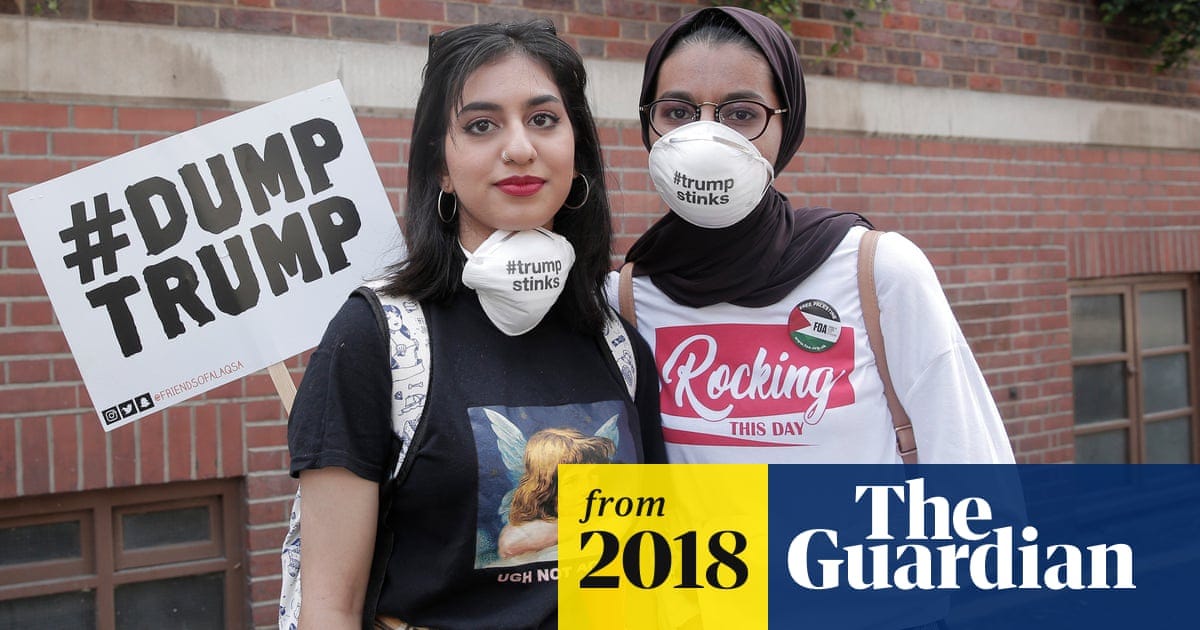
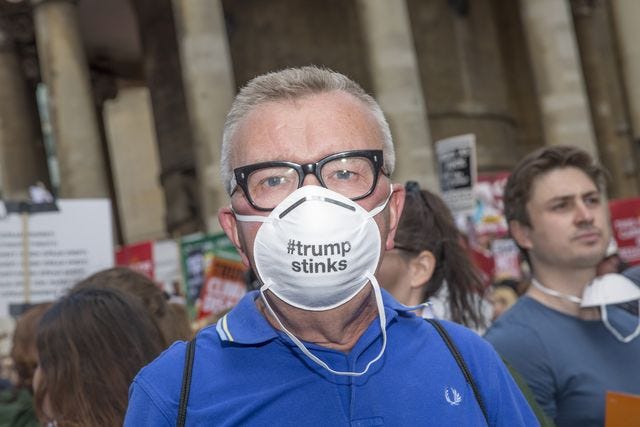
In reporting on the London protests pictured above, CNN took taking the habitually dismissive tack both media and progressives take in describing the use of “memes” (emphasis supplied):
For those who hadn’t prepared their insults at home, piles of placards emblazoned with anti-Trump messages—such as “Dump Trump” and “World’s #1 Racist”—lay banked by Oxford Circus underground station for anyone to pick up.
Others left their wit aside, wearing face masks printed with a simple message: “Trump stinks.”
CNN’s mandate that political attacks be witty notwithstanding—and keeping in mind the obvious rejoinder that Trump’s own most effective political attacks have never been witty, nor been required to be by major media—many media organizations felt the most telling images from the 2018 London protests were the two words “Trump Stinks” hashtagged on a face mask.
And indeed, the simple-but-effective message of these pre-COVID-19 masks returned during the 2019 Women’s March, from which event the mask pictured below hails.
In 2020, still pre-pandemic, such gear was sent to the Pitt Rivers Museum in Oxford, England to become part of the historical record of the Trump era (see a photo of some such items below):
More recently, MadDogPAC released a Twitter ad that boiled down the longstanding campaign to its essentials:
What all of the foregoing underscores is that the trope of Trump being smelly has now been around for four decades in various forms: on social media, in activist campaigns, on the comedy circuit, in high-profile interviews, in audio recordings of key historic events, and more. But because American media has eschewed the topic as somehow beneath its notice—while airing every bizarre Trump allegation that springs to the man’s mind in situ, from grotesquely mocking a disabled reporter to the hundreds of times Trump has found a novel way to insult his rivals’ weight (most recently that of Nikki Haley donor Reid Hoffman)—we have never gotten any sustained journalistic attention to this question and/or why it matters from major corporate media.
Meme Warfare and Trump’s Scent
It’s already been well established by the New York Times that Trump and his campaign have either been illegally colluding with a clandestine troll cabal or doing everything possible to leave the impression they’re doing so. This means that Trump’s campaign believes he can be returned to the White House in part on the strength of memes, and is willing to create (at a minimum) the appearance of illegal coordination with dodgy edgelord cabals to achieve that end—even if they’re self-evidently reminiscent of the Russian-intelligence-paid, pro-Trump troll farms of the 2016 presidential election.
And why not? The latter scheme worked well for Trump in 2016, and no one in his inner circle ever went to prison for spreading all manner of vile Russian memes on Twitter and other social media platforms.
Indeed, Trump is arguably just as right to rely on memes as the Democratic Party is to be wary of them. As someone who taught memes at University of New Hampshire for years—see the Memes section of Retro for more—I can say that memes are at once powerful and puerile, and while generally those with integrity shy away from overusing them, such well-intentioned persons do so at their own peril when it comes to politics.
Simply put, memes can win elections.
It’s not just the FSB or The Lincoln Project that thinks so.
For this reason, this report offers, below, examples of that rarest of digital detritus: the leftist meme.
While of course leftist memes exist, they’re dwarfed in number and intensity by right-wing memes to the point that one might seriously hazard a guess that there are ten right-wing memes in the American sector of the internet for every one left-wing one.
Proof here offers examples of memes relating to Trump’s smell because their sudden appearance and spread could be a sign of the first-ever serious attempt by progressives to meet MAGAs on the meme-strewn battlefield they’ve been deployed on since 2015.
Some Trump Memes and Meme-Images Relevant to This Report
Conclusion
Twelve months before Trump announced his 2024 presidential campaign—and it may be hard to remember, but speculation that Trump was about to announce a campaign against Biden was rampant for well over a year before he actually did—Trump fans on social media tried to spread the lie worldwide that President Biden had “pooped his pants” during a public event with Pope Francis in Rome.
This disinformation campaign (whose core premise was quickly and thoroughly debunked) came with readymade hashtags like #Poopgate and #PoopyPantsBiden.
This MAGA salvo in the ongoing information war started by the American far-right wasn’t necessarily motivated by a hatred of older Americans; after all, Trump voters skew much older, and in consequence might produce some blowback against young edgelords trying to spread an ageist trope on Trump’s behalf. Rather, the likely motive behind the Poopgate Hoax was more sophisticated: the idea, unproven but facially plausible one, that American voters can’t visualize as commander-in-chief any person, male or female, who can’t control their bowels. Is that fair? No. But politics almost never is, and human beings rarely are. A bias against incontinence in the American voting population wouldn’t be the most odious voter bias we currently experience.
Of course, cynics might see yet another motivation for the Poopgate Hoax that hits a bit closer to home: in a far-right political “movement” that openly cherishes the tactic of consistently accusing your opponent of whatever malfeasance you yourself aim to hide, it’s possible that years and years of rumors (and in some cases highly public and specific and non-anonymous accounts) about Trump’s incontinence caused his fans to try to transfer that stigma to Trump’s political opponent. Is it possible they believed doing so might inure voters to past, present and future allegations against Trump that they worried would hit the former president particularly hard at the polls? Absolutely.
Or perhaps the hoax was merely an attempt to dovetail with wildly exaggerated claims about President Biden’s mental and physical condition—claims launched and stoked by Trump himself without concern for the truth or with any pity or warmth for anyone.
Whatever its origin, the Poopgate Hoax underscores for us today that in American politics—pun acknowledged—s*** can get serious. And right now, s*** definitely is.
The simple fact is that we haven’t had a politician as vapid and superficial as Donald Trump in decades, if ever, and one notable result of this is that certain features of leading politicians in the United States—including their personal hygiene—are on the table in political debate precisely because Trump has insisted it be so, not because anyone in the Democratic Party thinks that this is how to conduct public discourse on complex policy matters. While this may appear to some as a “he-started-it” defense, it is actually anything but: yes, Trump moved the Overton Window on acceptable public discourse, but it’s the American electorate writ large, and our corporate media writ large, that have decided to reward Trump’s vicious realignment of our values and habits. Trump can’t do to this country, or more particularly to its electorate, anything that electorate doesn’t allow him to do. The question, really, is whether Trump critics must continue to play-act like it’s 1980 or 2000 when they are daily reminded it is not.
Anti-Biden merchandise falsely alleging that the current President of the United States smells because of incontinence is neither hard to find nor hard to understand. As Olofsson and Inbar have shown us, this narrative sells—and sells like gangbusters—among far-right zealots because they’re far more likely to react viscerally to body odor than most others are. But for this very reason, supplemented by Trump spending years dining out on an “alpha male” image the notorious draft dodger never did anything to earn, we can understand why Trump, his advisers, and his most ardent advocates in far-right media are apparently more concerned about Trump being positioned as an incontinent man than as the rapist the federal courts have already declared him to be.
Consider that last fact for a moment: Trump being a rapist is a satisfactory state of affairs for most Republican voters in a way that him being incontinent, smelly, and generally foul as a matter of personal hygiene would not be. And it’s in this context that an implicit demand comes down to journalists and Trump critics that they must never discuss his reputation for odoriferousness? At a time when the man is tied or leading in the race to become the next president of the United States and says that if he wins he’ll become a “dictator”?
Attorneys like me are fond of the historical maxim, often cited in legal opinions as lay shorthand for far more complicated legalisms, that “the Constitution is not a suicide pact.” We sometimes hear a variation of this: “American democracy is not a suicide pact.” But an equally reasonable corollary would hold that political discourse in the United States in 2024 cannot and must not become a suicide pact.
If a statement about a political candidate is (a) true, (b) relevant to how real-life voters make their decision to who to vote for, (c) suggests (in a variety of ways too numerous to count here) that the candidate in question has lied to voters for years, and (d) is in response to attacks in kind made by that candidate and his supporters for years now, any journalist who decides to ignore the statement is making a partisan determination and any voter who selectively does so a hypocritical one.
Yes, the apparent fact that Donald Trump is chronically flatulent, incontinent, and just generally smelly in a way that’s deeply upsetting to all those around him—from friends to coworkers, foreign leaders to even some admirers—is now much more a part of everyday U.S. political debate than those on the political left would ever have imagined or wished. But this isn’t even the hundredth or thousandth most surprising shift in U.S. political debate over the last decade, and nearly all of the worst ones on any such list we might imagine were gleefully authored by Donald Trump himself.
Incontinence as a medical condition should not have any stigma associated with it, full stop. Incontinence can be caused by age or by other factors well outside the control of a sufferer of incontinence. Indeed, it could reasonably be said that many of us will at some point experience incontinence as we age. But for political or personal or other self-aggrandizing reasons equating the question of whether a former POTUS smells awful to ageism is unacceptable.
Trump’s issues with odor appear to have begun many decades ago, when he was in his thirties, which means either (a) they stem from a serious medical condition he has since endeavored to lie ruthlessly to voters about, (b) they stem from dubious personal habits like drug abuse that American voters have a right to know of, or (c) they arise from personal hygiene issues of another sort that Trump himself opened the door to regular discussion of on the campaign trail by (i) regularly attacking the personal hygiene of political opponents, (ii) making ageism (not to mention disinformation related to age) the centerpiece of his two campaigns against Joe Biden, and (iii) making a decision—in the midst of pursuing a white supremacist political base—to put himself forward as an ideal specimen of “alpha-male” toughness, charisma, and sex appeal.
The New York Times reports that Trump has a “long fascination with genes and bloodlines”, and that this fascination has recently turned toward neo-Nazi themes—like publicly praising white Scandinavian Minnesotans for their “good genes” while positioning cities with large Black populations as dens of sloth, hopelessness, and depravity, or accusing nonwhite immigrants of “poisoning the blood of our country.”
But for all that GOP primary voters clearly respond to “body horror” rhetoric of this sort, using such language is clearly even more personal for Trump than just a matter of winning elections.
Trump has justified his false attacks on Biden over his mental and physical condition by saying that he himself doesn’t need to worry about aging—nor is he open to the very attacks he has (again, falsely) leveled against Biden—by saying that no one in America has cause to worry about him being President of the United States because “my father lived much longer than that [age 93]. My mother lived much longer than that [age 88]. So genetically, that’s a good thing.” (Keep in mind that if the former president wins re-election later this year he will be 82 years old in the last year of his term, and he has repeatedly floated seeking or seizing an illegal third term that would keep him in office until he was 86—just two years younger than his mother was when she died.)
The best part? The parents of the man (Joe Biden) whose genes Trump is implicitly denigrating in the statement above—Catherine Biden and Joseph Biden Sr.—lived to be 93 and 87 respectively, putting their longevity just beyond that of Trump’s parents.
The New York Times also reports that Alzheimer’s runs in Trump’s family. His father Fred suffered from it in his eighties, the decade Trump would be in in a second term.
This may be why, despite Trump’s success at getting Americans to question President Biden’s mental acuity and physical stamina, the truth is that according to Joe Biden’s latest physical exam, he is (per his doctor) “fit for duty and fully executes all of his responsibilities without any exemptions or accommodations.” Instead it is Trump who has a history of falsifying medical records and lying to voters about his medical status. All of which raises the stakes exponentially on Trump continuing to hide his own health issues—many of which might be uncovered by the ongoing journalistic investigations of his “distinct body odor”—even as he and his fans falsely cast doubt on whether the sitting President of the United States is fully capable of doing his job.
This author notes as well, as a Trump presidential historian, that historians broadly agree with the assessment of current White House doctors. In the first-ever poll of historians focused on U.S. presidents that includes President Biden’s first term, the Siena College Research Institute Presidential Expert Poll of 2022, we discover this professional comparison of Trump’s only term (from ages 70 to 74) and Biden’s first term (from ages 78 to his present 81):
Measuring past and current presidents in 20 attributes, abilities, accomplishments, and statuses—including Background, Imagination, Integrity, Intelligence, Luck, Willingness to Take Risks, Compromising, Executive Ability, Leadership, Party Leadership, Communication, Relationship with Congress, Court Appointments, Executive Appointments, Handling the Economy, Domestic Accomplishments, Foreign Policy Accomplishments, and the Ability to Avoid Mistakes—presidential historians put Biden in the Top 20 in American history (#19) and Trump third-to-last.
With Americans facing only their second-ever presidential race between two U.S. presidents, and with the record of the challenger (Trump) being so obviously worse than the incumbent in every respect, is it any wonder that we’re now talking about personal hygiene? After all, that’s the conversation that Trump wants to have, not because it’s a conversation that frames Trump as superlative and Biden lacking but because—and this is critical—it’s a conversation Trump better knows how to have, is more willing to have, is experienced at getting major media to have in ways that benefit him, and is currently more politically productive for him than any other comparison he could invoke. Facing 91 state and federal felonies, a civil judgment declaring him a “rapist”, the end of the Trump Organization in New York state, hundreds of millions of dollars in fines, and the new and/or continued federal imprisonment of many of his leading aides and allies and attorneys and advisers and agents and associates, is it any wonder Trump wants to talk about physical fitness even though Biden runs regularly and Trump is (per the BBC) “scared of stairs”? Is it any wonder that Trump wants to talk about mental acuity when Biden merely has a lifelong stutter Trump can fashion into a mental impediment (as he did with deaf Oscar Award-winning actress Marlee Matlin, who he repeatedly called “retarded” simply due to her hearing impediment), whereas Trump has faced psychiatrists calling him mentally ill for years?
All of this is the vital context in which the debate over Donald Trump’s smell arises. It is a historically dire context that can’t be met with platitudes about never mentioning discussing the aging process in public or superciliously protecting Trump from the sort of honest critiques that carry one-one-hundredth the venom of his libelous ones.
In sum, when you run for political office as an “alpha male” who openly aspires to be an international strongman, you better be what you say you are.
And Donald Trump is not.
And there are consequences for his deceit on this point that go beyond the potential for humor in a president who regularly passes gas, poops himself, and smells like a sweaty armpit while hawking a cologne called “Success.” We have already seen Trump having little to no success as a face-to-face negotiator with tyrants around the world—he tends to kowtow to them, instead—and it’s hard not to imagine his embarrassment at his own stench and physical incapacities being a part of that. It is equally possible that Trump’s false and profoundly disturbing personal attacks against now-president Biden’s mental acuity and physical fitness stem from his own profound (but incredibly buried) humiliation over those same markers of authority.
Just so, if Trump’s allegedly uncontrollable evacuation of his bowels caused regular tumult on a mere television show—and a pretty schlocky one, with an apparently incredibly lax internal subculture, at that—what disruptions do we imagine it having caused in the past in the Oval Office? And would we imagine this situation getting better or worse now that Trump is a decade older than he was during the heyday of Celebrity Apprentice? Worse still, if in fact it’s true that Trump has stopped taking the ADHD drug(s) he once took on a regular basis to avoid their worsening side effects, what does that mean for the signs of advanced ADHD we see in Trump on a daily basis—and how could those symptoms create real problems for a commander-in-chief with his finger on the nuclear button as wars rage in Europe and the Middle East?
Finally, how many discrete, blackmail-worthy secrets do we want a president to have, given the recent revelation that Jeffrey Epstein may have had tapes of Donald Trump having sex? (This allegation was made—and then retracted—by a long-relied-upon Epstein victim who tellingly cited fears for her own safety while she was “recanting”.)
And how is all the following inflected by a strange but apparently accurate piece of trivia: that while Trump is oddly proud of his adulteries, making them less likely to be effective subjects for foreign blackmail, he’s extremely sensitive to discussions of how he smells, whether he wears diapers, and whether he has (to put it bluntly) butt issues?
Trump’s anxieties don’t have to be rational or devoid of schadenfreude to endanger us.
While by now none of us are particularly surprised to learn that Trump has been running yet another long con, hiding from us information that we might well feel we are entitled to as voters, that that long con would be so “of the body”—that what he’s lying most grievously about would be his own body—is an uncomfortable yet almost profound realization. If Trump will lie, as he has and continues to, about his height, his weight, his hair color, his makeup use, his medical records, his medical procedures and so much more as he contends that his political opponents (who aren’t doing any of those things) are the ones so sensitive to such matters, what else is he hiding from us? What else would he be willing to lie about?
The answer—as ever—appears to be anything and everything. And that is terrifying.


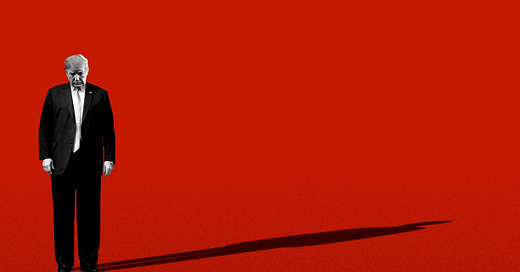




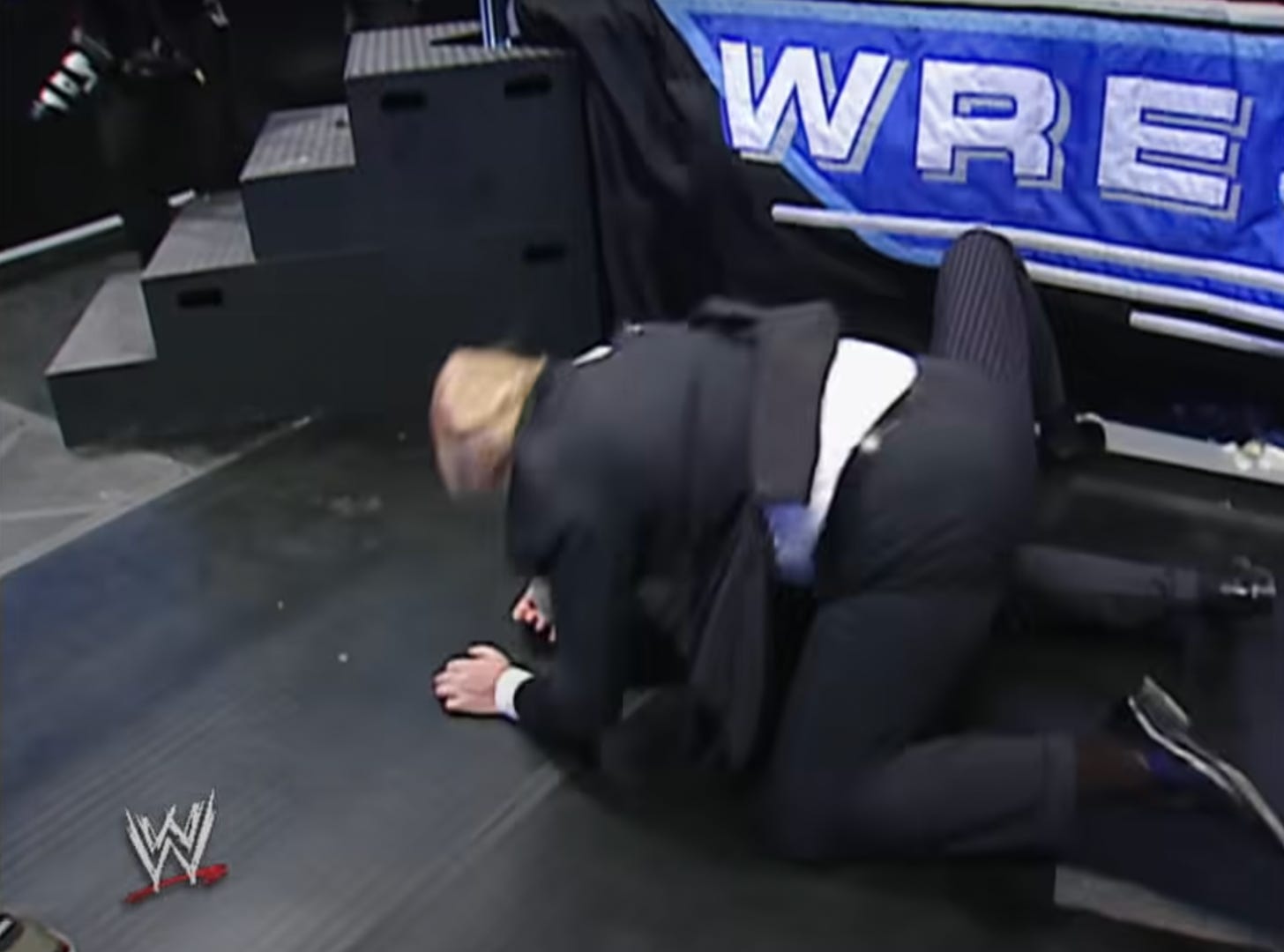
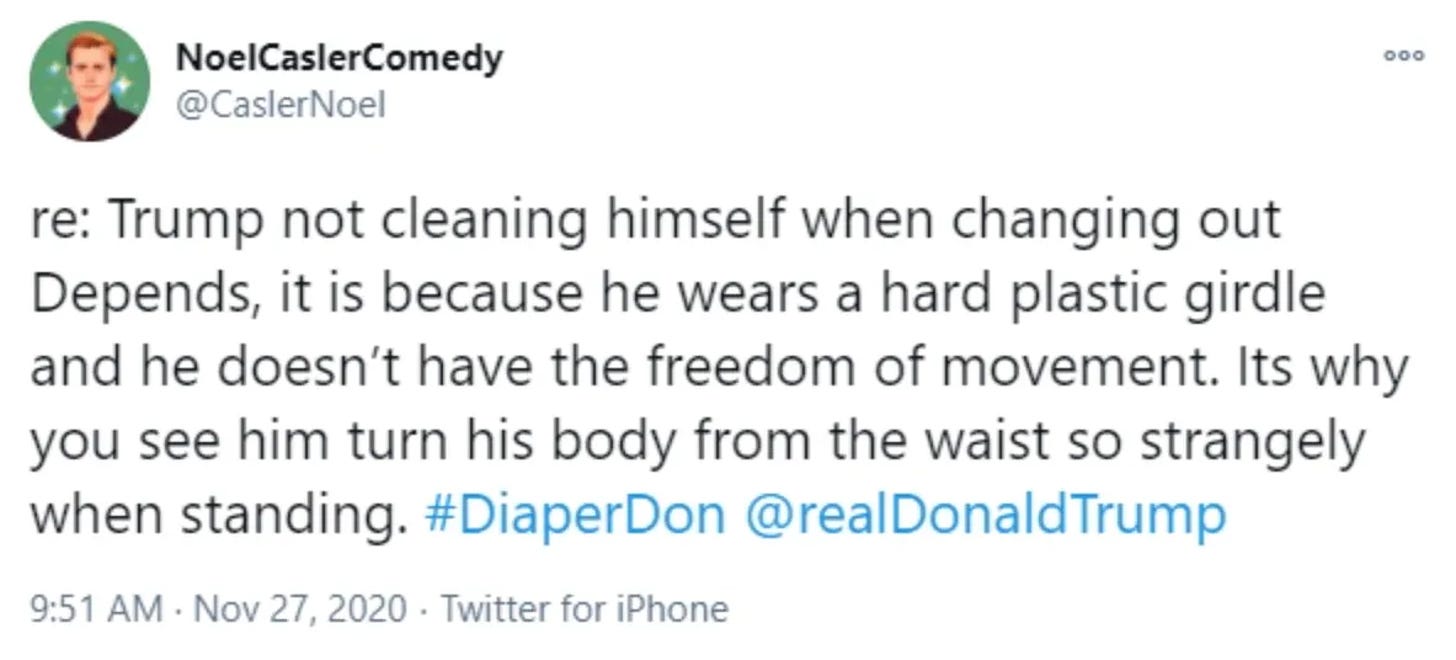


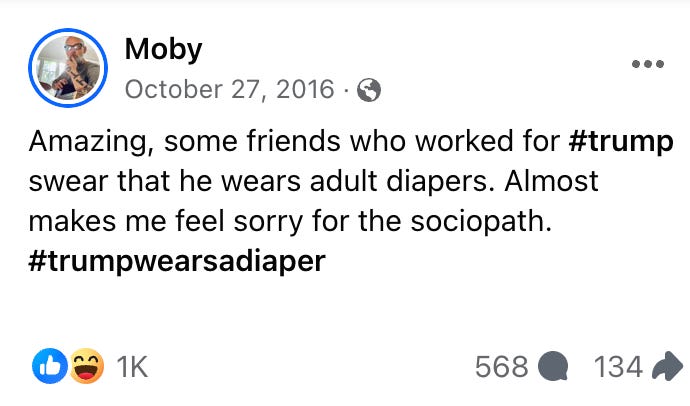



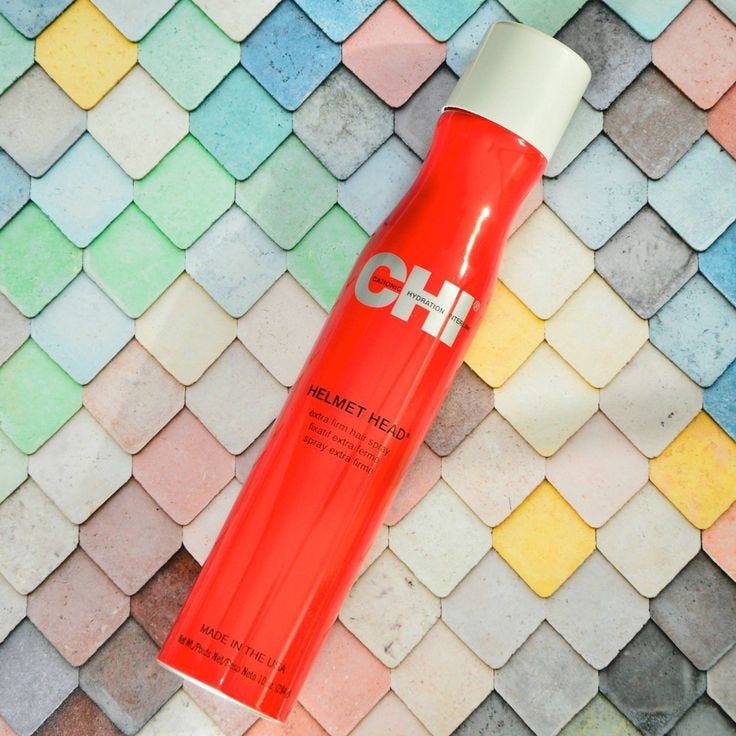
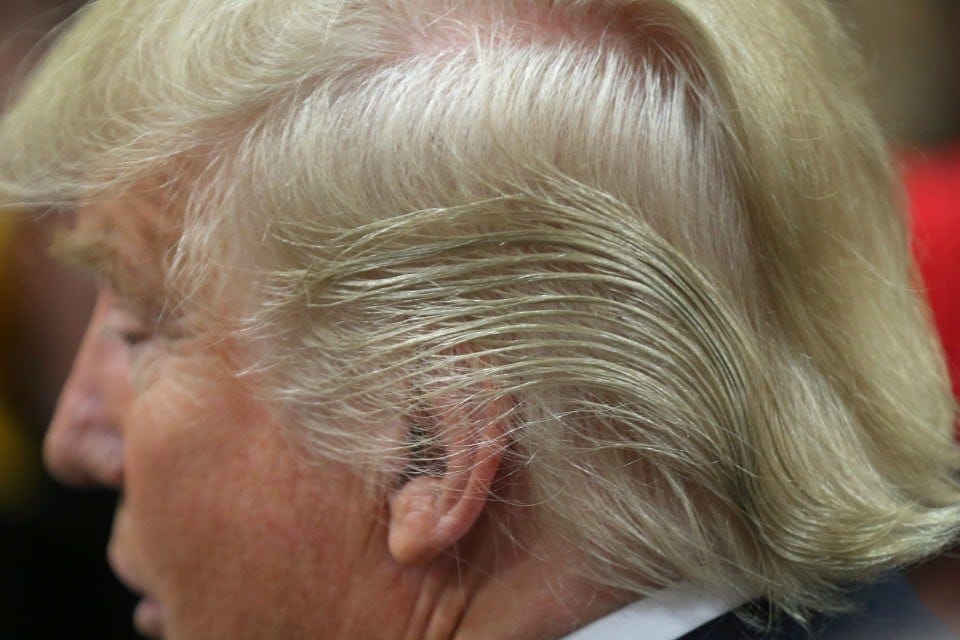
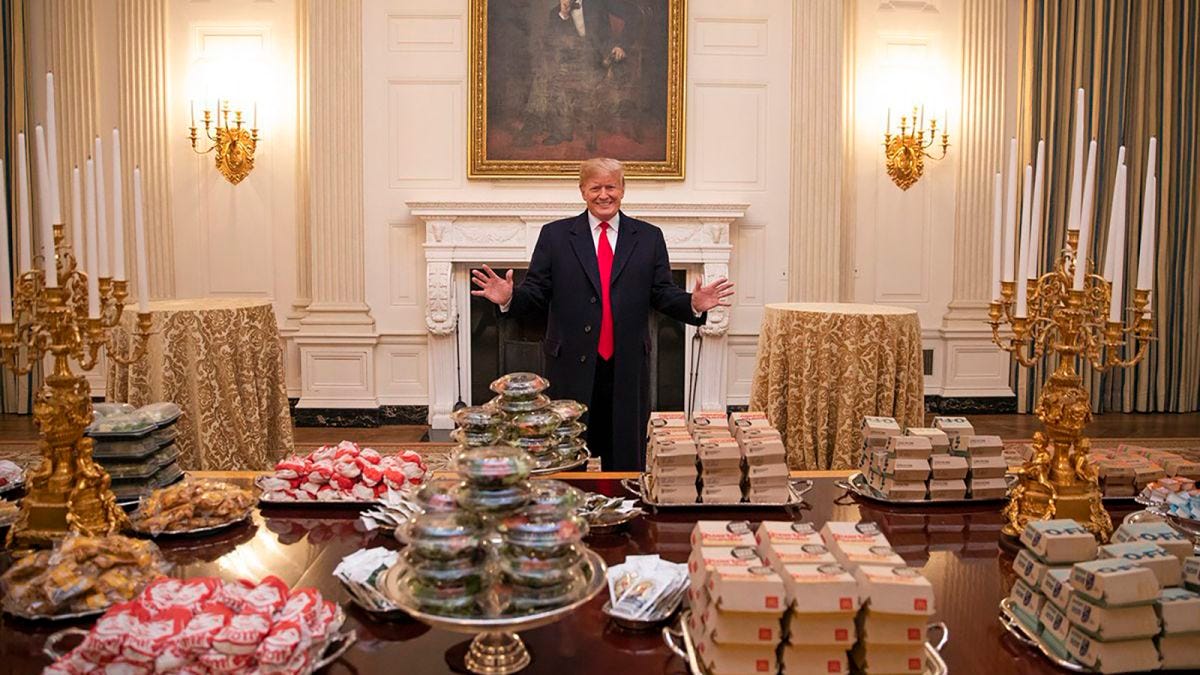
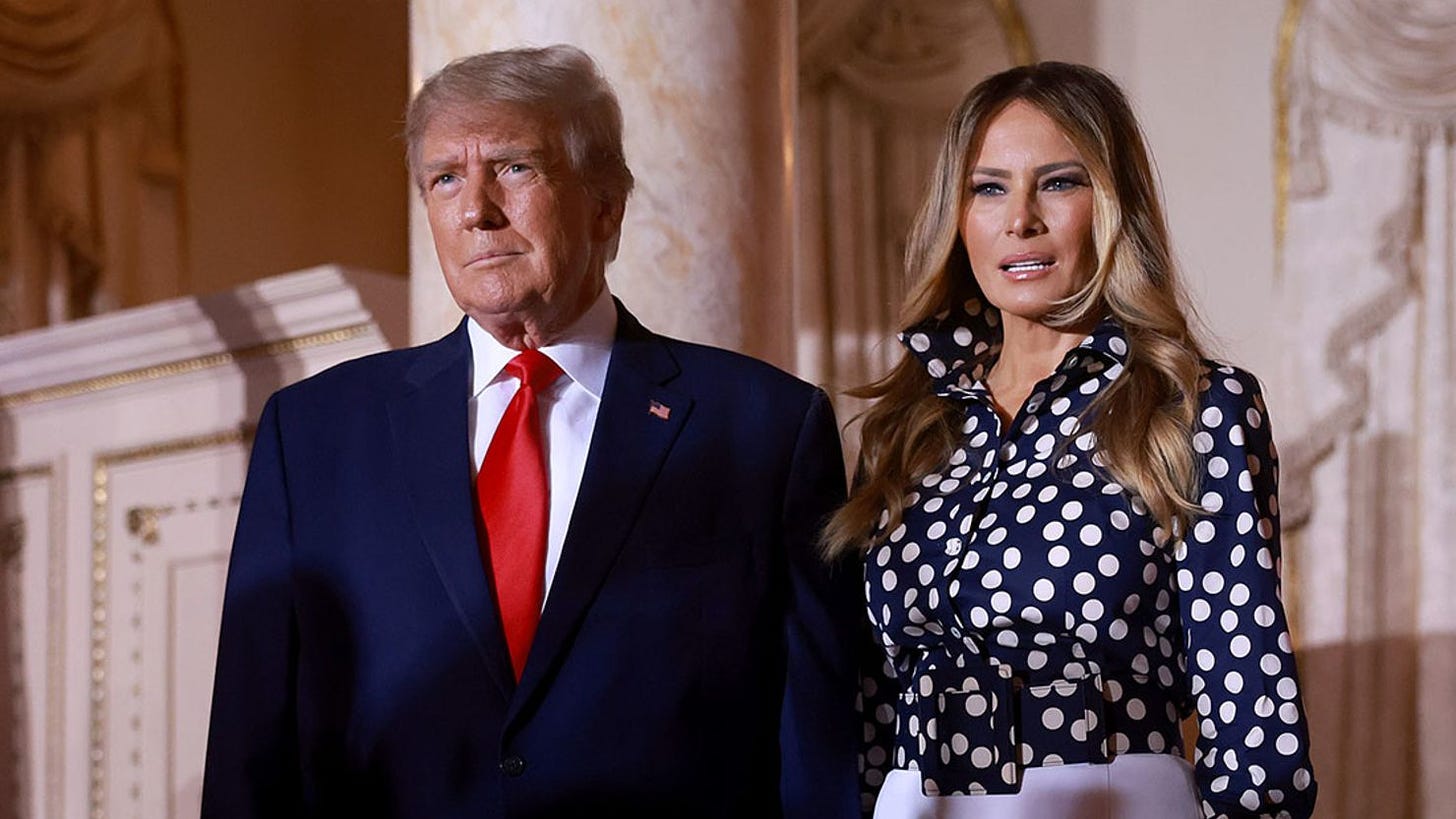
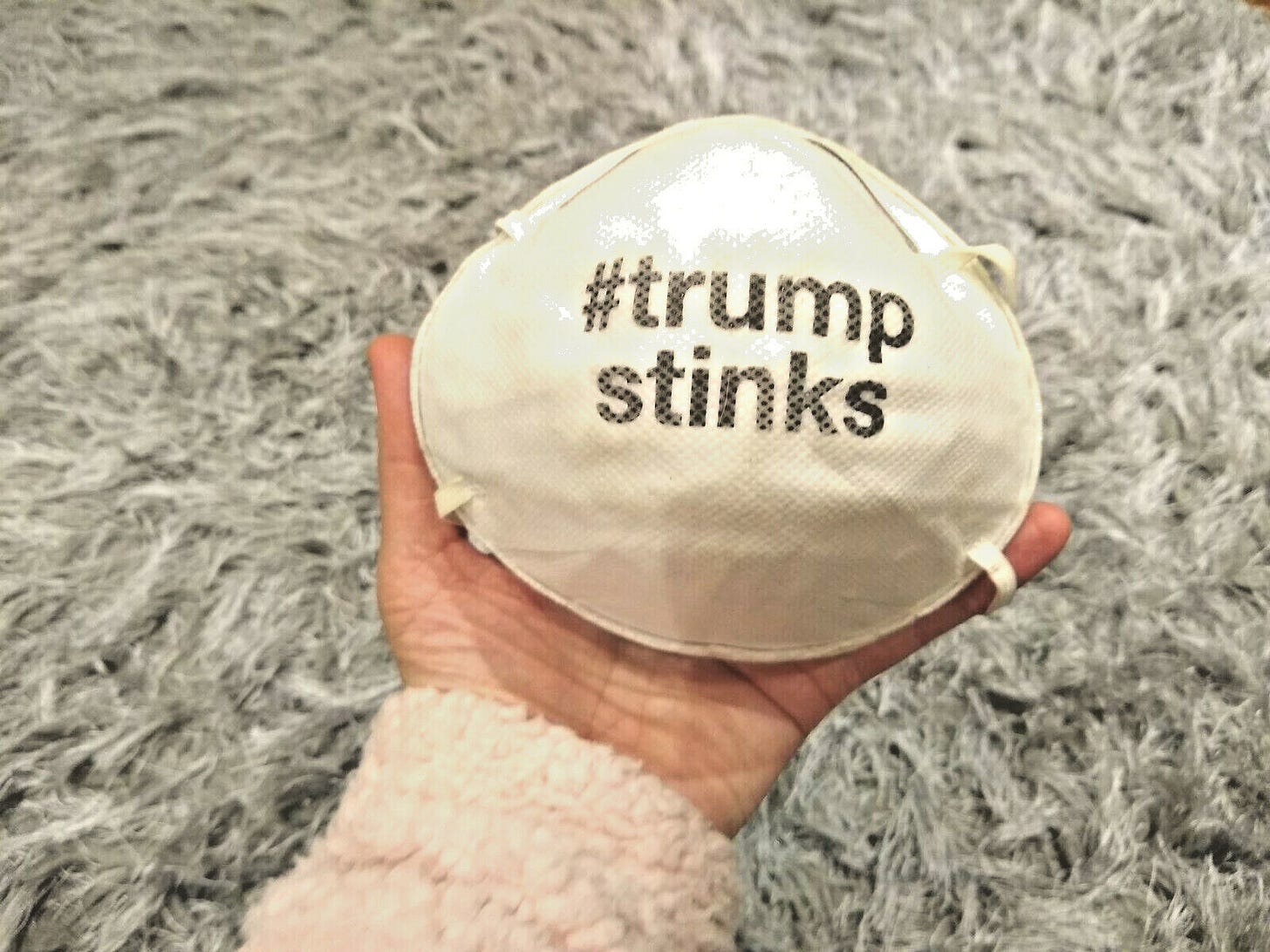
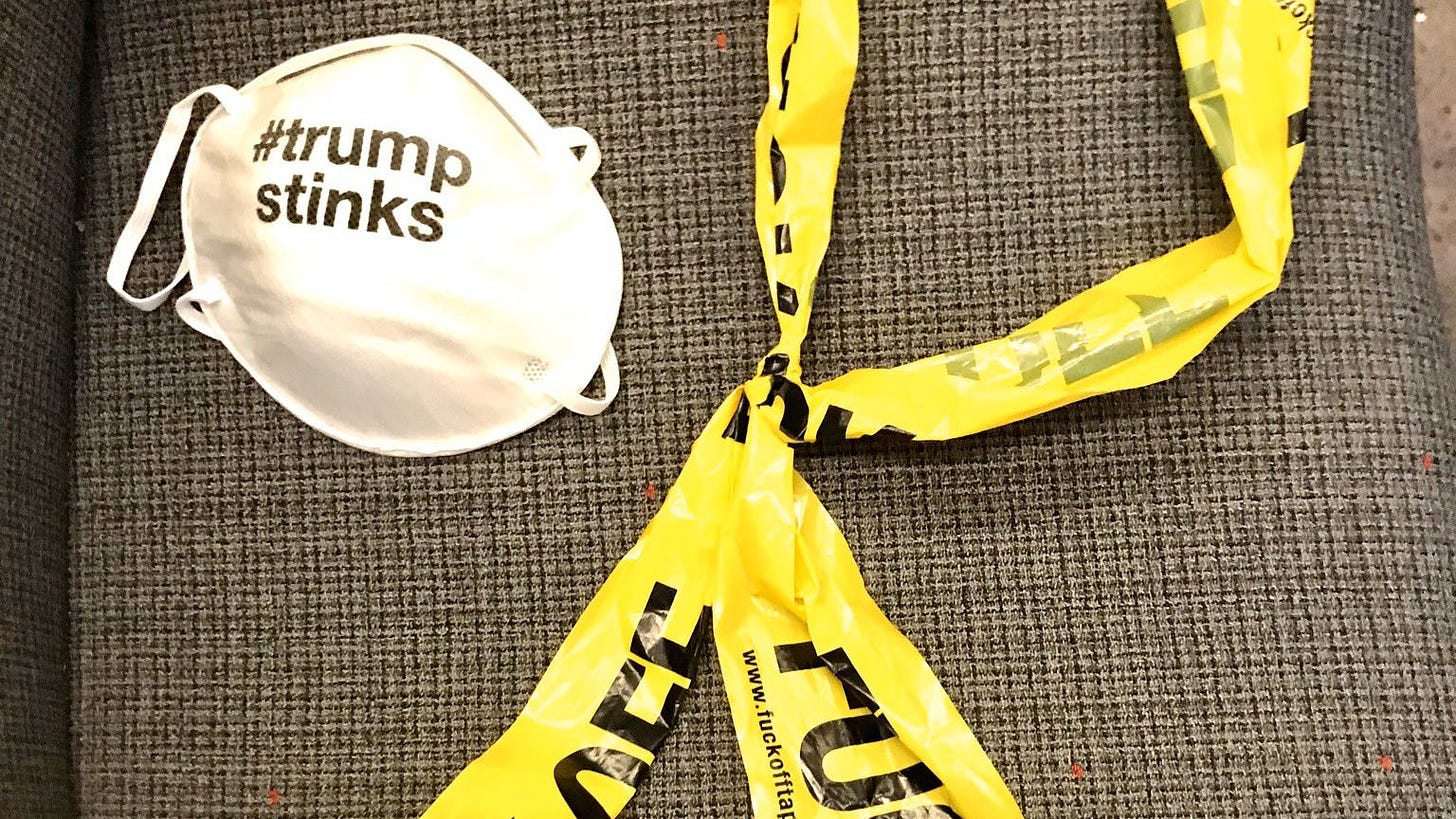




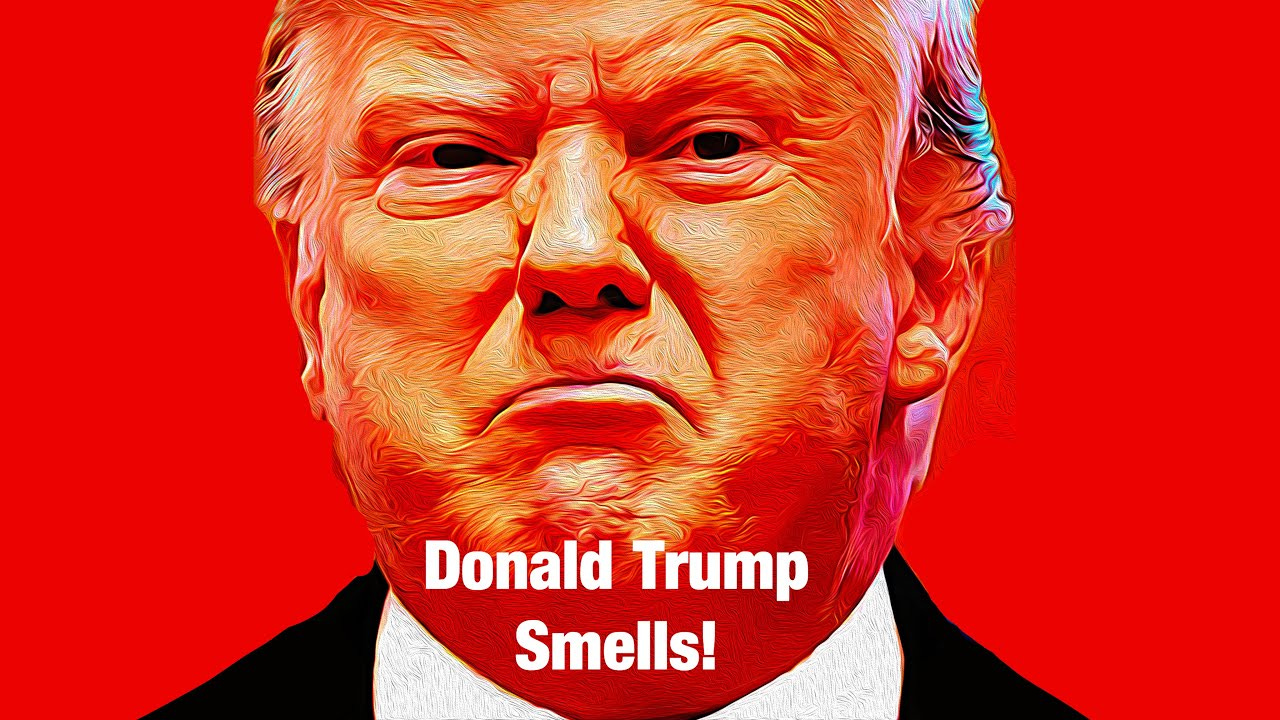


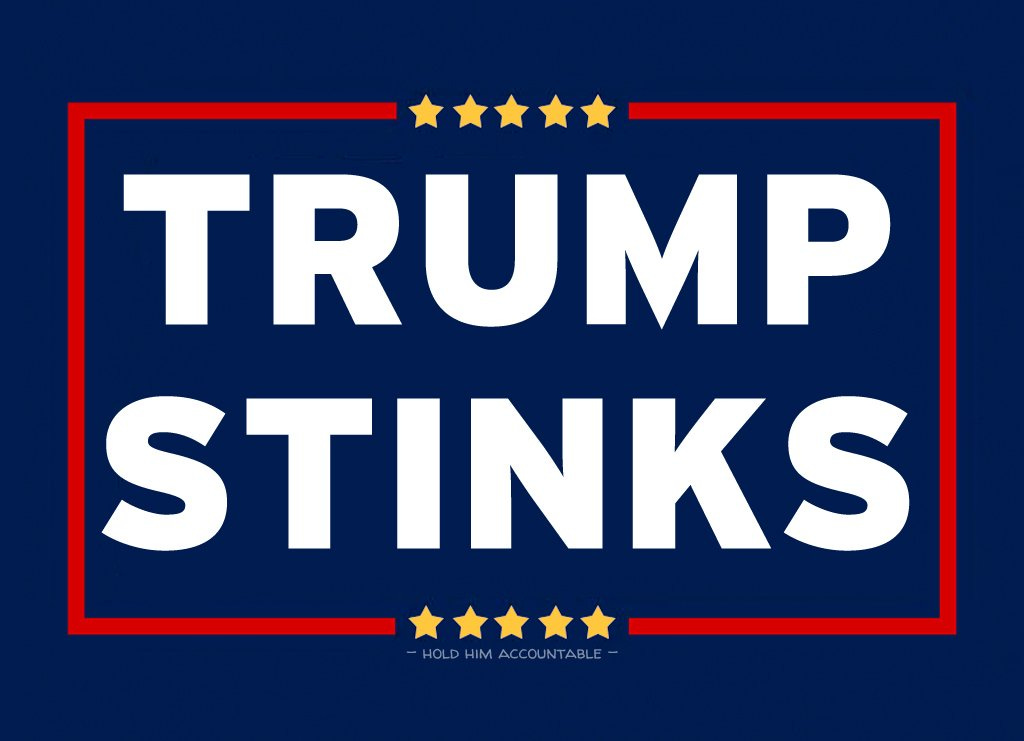

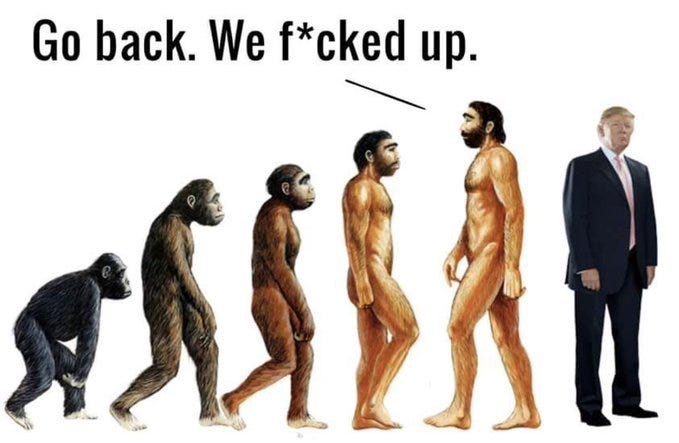
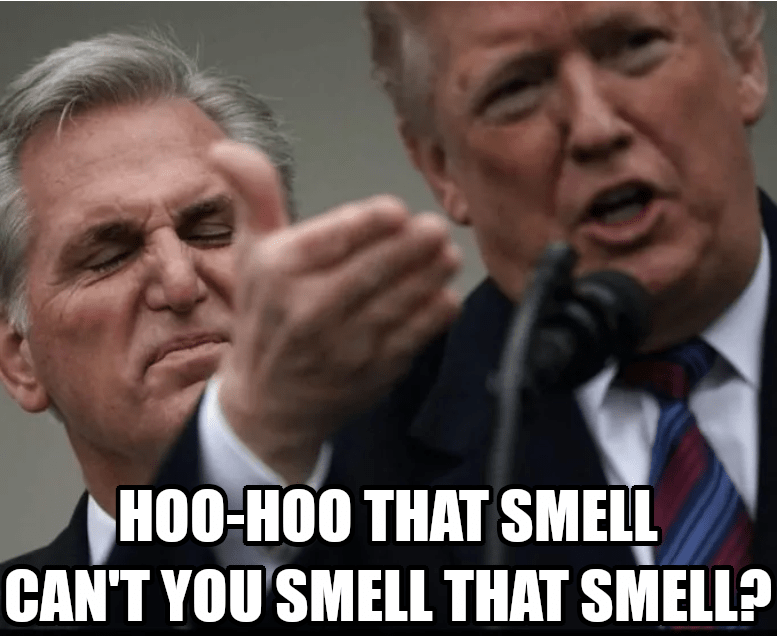

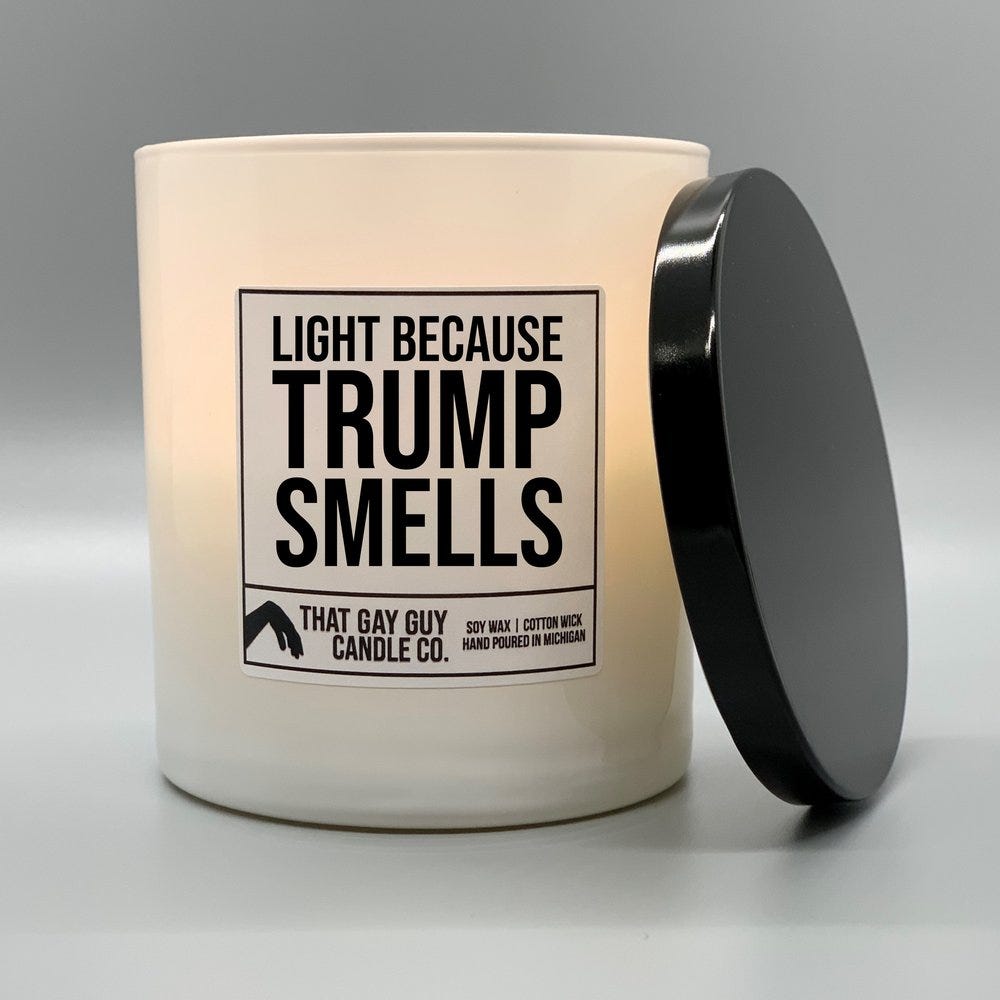
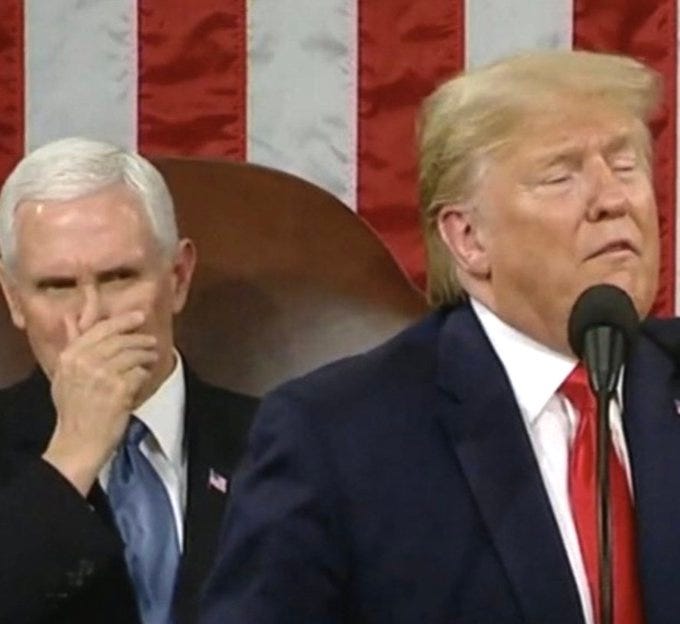
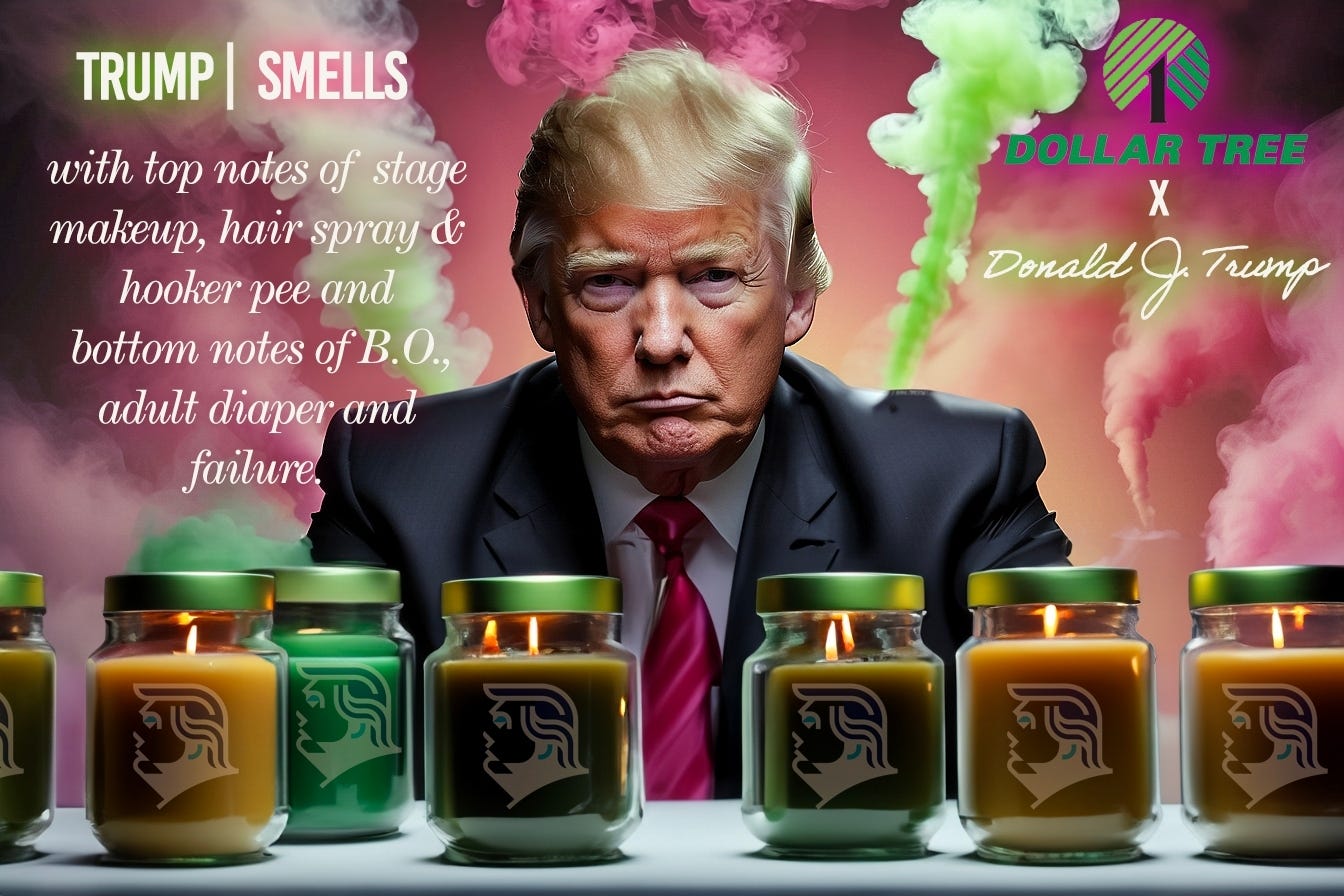
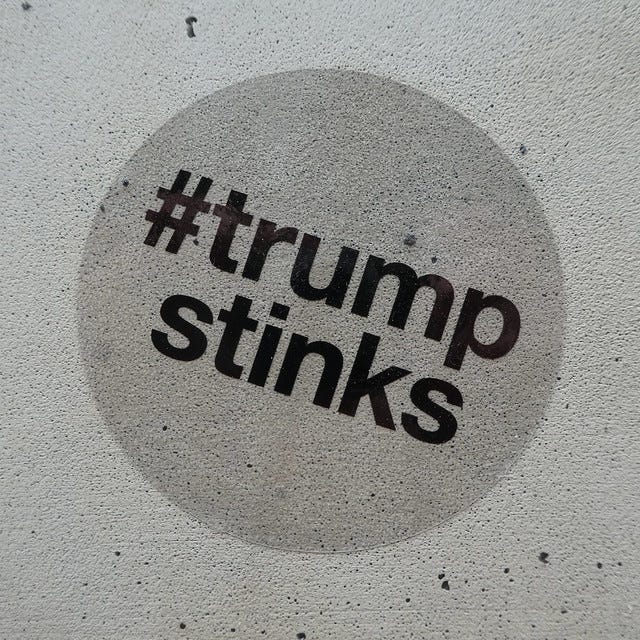
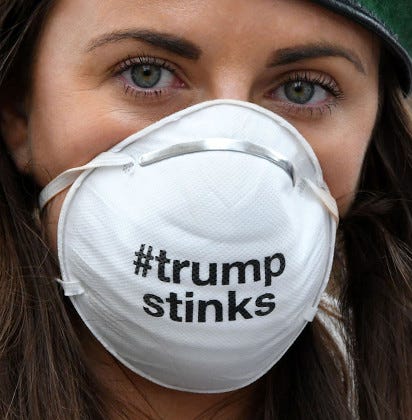



I think democrats would be stupid NOT to attack him regarding this long known issue he has about his disgusting stench. He deserves every bit of the spotlight people are shining on him about it. He’s such an evil, nasty piece of human garbage that ANYTHING we do to keep him from ever taking the oval office again is justified. He needs to acutely feel the same cruel burn of humiliation which he has inflicted on people who are much better than him. I want to see him jailed and a pauper and his entire empire and his reputation destroyed for what he has done to tear this country apart.
People of many different ages may exude an odor that is not agreeable
to another. It could be due to eating gobs of garlic, taking certain medications, being homeless, or even not knowing that one needs gallbladder surgery. Yeh, it’s hard to see body odor as a topic of journalism.
I think we’ve all been there. Too much garlic, alcohol, smoking or cologne, lack of soap and deodorant...or eating at a restaurant that leaves a significant scent to the point of others commenting that “you ate at so-and-so.”
But. But DT dishes it and can’t take it.
And he stinks. He stinks at following the rule of law. He stinks at being a public servant. He stinks at business. He stinks at truth.
He’s spectacular at bullying. He’s an accomplished liar.
We are not hearing much rebuttal from him on this odiferous issue. And the snipey side of me thinks this has to really bug him.
And for that reason, I like this slogan of “he stinks.” He just does.